#all of my original characters have undergone major . . . developments
Text
reverse writing my original works by writing fanfiction of my original works , , , that should do the trick, yes?
#caroline talks#all of my original characters have undergone major . . . developments#i totally scrapped at least 3 storylines#tweaked the genre#renamed characters bc i realized that their names were Not Actually Who They Were#(more like. they knocked on my door and was like 'hello. this name doesn't fit us anymore.')#(and i was like 'u know what. fair.')#the plot is now just one big metaphor for queerness and mental illness i think#the kim su jin inspiration the mike flanagan inspiration . . . really popping in this corner tonight!
10 notes
·
View notes
Text
Costume Spotlight: Guillermo's Sweaters in WWDITS Season 1

One of the things that makes WWDITS so visually compelling is the way the characters have the real-world equivalent of cartoon uniforms. But instead of wearing the same thing every day, they wear variations on the same theme every day. This serves not only to establish a strong visual identity for each character, but also provides opportunities for visual shorthand to underscore a particular bit or even a major character or relationship arc with a wardrobe change.
Guillermo has undergone just such a transformation many times over the course of the show's current five seasons, with his clothes becoming better fitted, more coordinated and intentional, and more functional as his arc has developed. But throughout it all, the sweaters have remained a key part of his character uniform.
If there's one piece of incontrovertible proof that vampires have no taste (affectionate), it's the fact that Nadja, Laszlo, and Nandor keep calling Guillermo's sweaters shitty. Never have I so envied a character's wardrobe as when I first saw Harvey appear on my screen in a seemingly endless succession of gorgeous, thick, intricately patterned and textured, cozy sweaters. But as I said in a recent post, that proved to be a massive undertaking, so I've broken it down into somewhat smaller posts by season. Starting, of course, with season 1!
Guillermo wears sixteen different sweaters and cardigans over the course of season 1 alone (and at least five different jackets, not counting the suit jacket he wore to Madelin's funeral in 1x10--I'll do a separate post on the jackets at some point). These tend to fall into a few broad categories.
Fair Isle Knits
Though many of us in places without year-round sweater weather may think of Fair Isle as primarily a winter holiday motif, the term actually refers to a particular method of knitting that allows the knitter to incorporate multiple colors using two strands of yarn or more. Traditional Fair Isle patterns incorporate five colors. This method originated in Fair Isle, Scotland, thus the name. (Source)
Fair Isle sweaters are typically made of high quality cotton or wool, and can create intricate patterns such as the bird motif on this sweater from 1x02 and 1x07.

Guillermo wears Fair Isle pullovers and cardigans the most often throughout the series, especially in the first season. The most distinctive of these is the bird pattern above, but he also wears a multicolor cardigan in 1x01, as well as a more abstract gray-toned Fair Isle sweater, a brown one, and even a red one throughout the season.
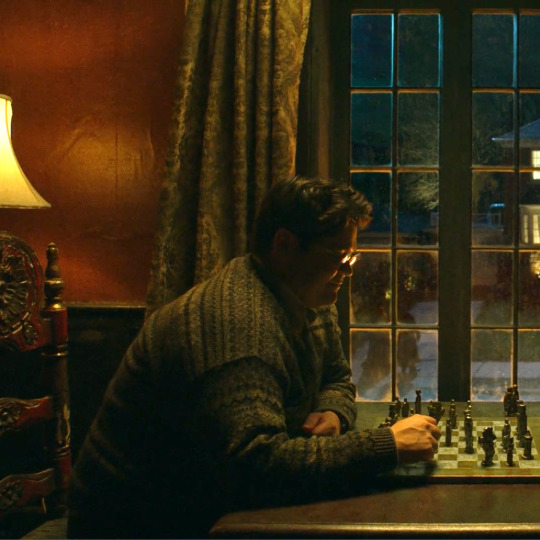
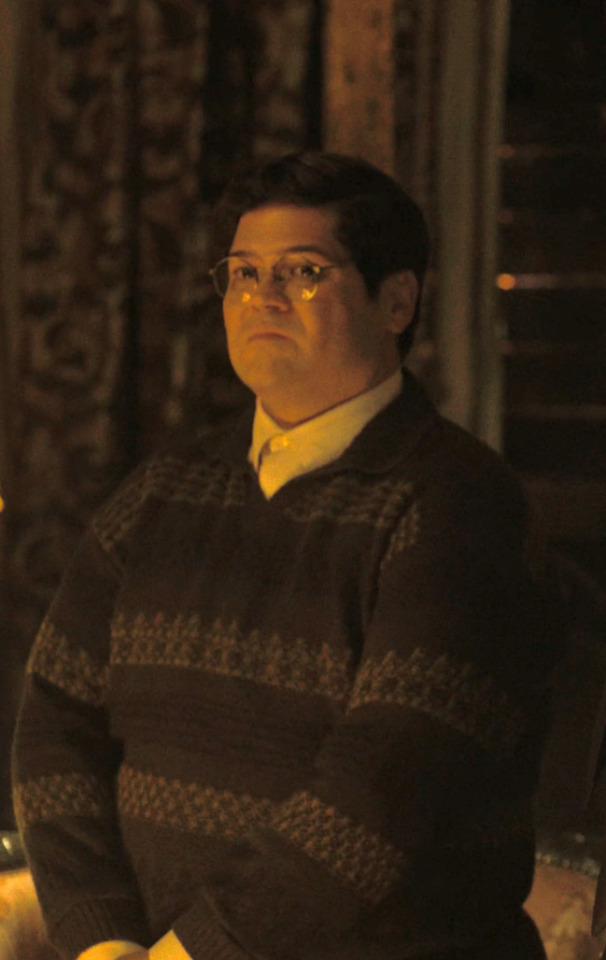
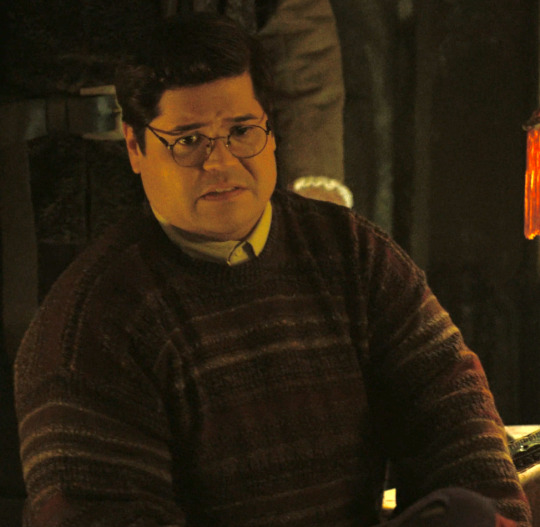
These sweaters are not cheap, either, at least not when of the quality he typically wears (many cheaper Fair Isle sweaters only feature the technique on the front or collar of the garment, with the rest of the garment being all one color). A well-made Fair Isle sweater can easily cost in the hundreds, and Guillermo has around half a dozen or so of them in the first season. This lends credence to my personal headcanon that Guillermo, who works for no pay and owes $1200 a month in rent, most likely gets a lot of his clothes by gift or by thrift--that is, they're presents from family members or he gets them heavily discounted at secondhand stores or websites.
Mosaic Knits
Mosaic knitting, like Fair Isle, is a technique for incorporating multiple colors into a single garment. In this technique, however, you only knit with one color per row. It is meant to be easier than other colorwork methods of knitting, and does not have floats (loose strands of leftover yarn on the back of the knitted work) the way Fair Isle does.
Mosaic knitting is great for creating colorful, repeating patterns, and can be done flat or in the round. Mosaic patterns can also be made to be reversible, due to the lack of floats, and the finished product is generally stretchier than the results of other techniques. (Source)
I also just really like the texture of mosaic knits? There's something about the way the threads fit together that scratches my brain pleasantly.
You can see an example of this style of sweater in 1x03 and 1x04, as well as throughout 1x09, when Guillermo is helping to plan the Orgy.

Fun fact: there's a goof in the editing of this episode! Throughout most of it, Guillermo is wearing this thick, crew-neck mosaic sweater. This is interspersed occasionally with images of him wearing a thinner brown Fair Isle v-neck pullover with a polo-style collar. This kind of switch-up is not uncommon, as talking heads meant to be filmed at a different time are often interspersed with in-the-moment action.
But when Guillermo bursts into the room toward the end of the episode and finds Jeremy losing his virginity with Constantine, he is wearing the mosaic sweater. However, when he steps out of the room and pulls the door closed behind him a second later, he is suddenly in the brown v-neck pullover from his talking head snippets.

(Thanks to @karofsky for inflicting this cursed knowledge upon me. <3)
Guillermo also wears this Fair Isle sweater in 1x03, and at the beginning of 1x10.
Guillermo wears one other sweater which, based on the texture and pattern, looks like it could be a mosaic knit:
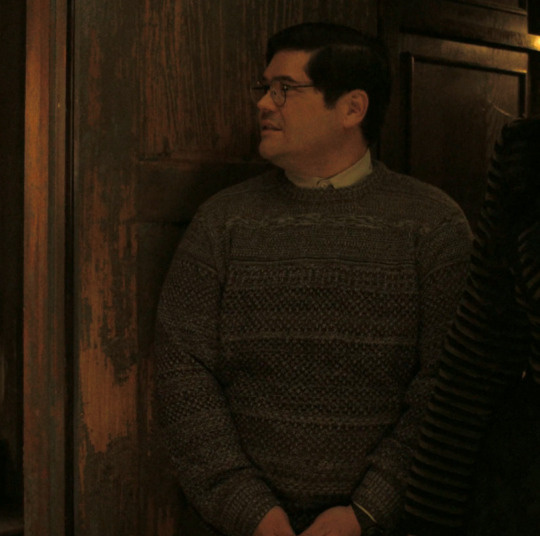
This is the sweater he wears at the beginning of 1x04, when Laszlo asks his opinion about the witch skin hat and when Nandor is "flying" him around in front of the mirror.
Coogi Sweaters
These are the most elaborate and unique-looking sweaters Guillermo wears in the show.
Coogi is an Australian clothing brand originally founded in 1969 (then called Cuggi), known for its unusual textures, organic patterns, and bright colors. Egyptian designer Hazem Elsheltawi is the original creator of Coogi's unique fabrics, which have been inducted into the Smithsonian Cooper-Hewitt museum. For more facts and a brief timeline of the brand, check out this blog post by Filthy Rebena Vintage.
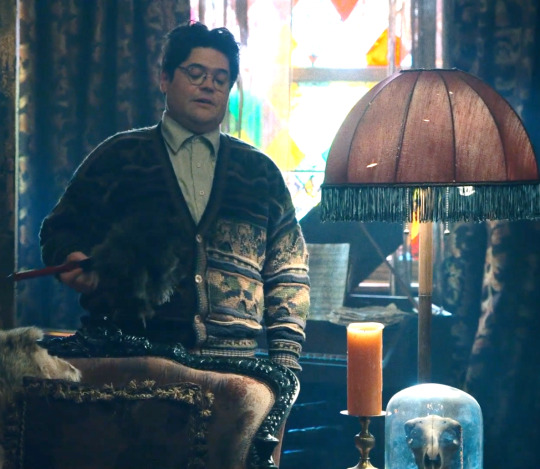
The distinctive Coogi style is achieved by combining several different knitting methods, including Fair Isle, Intarsia, ribbed and warp knitting, and stockinette and reverse stockinette knitting to create layers and textures that no one of the aforementioned methods could achieve on its own. The sources I found were conflicted on whether these sweaters are made by hand, or whether making them by hand would even be practical or feasible. For a thorough breakdown of a Coogi sweater and the various techniques involved, see this Reddit thread on r/MachineKnitting.
At first, I thought Guillermo only started wearing Coogi sweaters later on in the series, but upon closer inspection it appears he wears at least four Coogi or Coogi-style sweaters in the first season.
The first of these is in 1x02, an elaborately-patterned sweater in blues and reds that Guillermo wears to accompany Nandor to the City Council meeting (in what I like to call his Politician's Wife scene).

He wears this same sweater in 1x08 when he is assisting Nandor with studying for his citizenship test.
The second is the cardigan Guillermo wears in 1x06, 1x07, 1x08, and 1x10.

The third and fourth are also from 1x10, which is a very Coogi-heavy episode! Guillermo wears two black and white vertical striped sweaters that are very similar at the beginning and end of this episode.
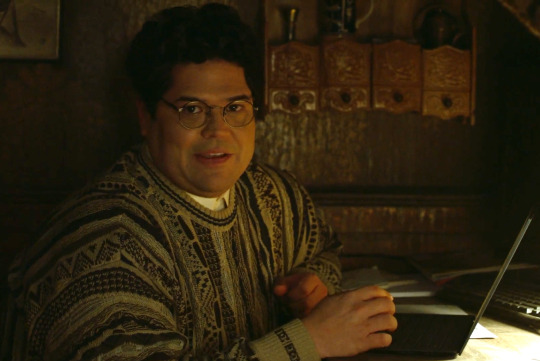
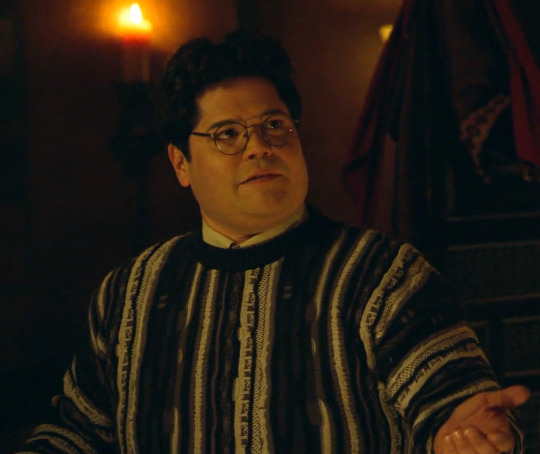
I know I said I was going to leave the character analysis for its own post later on, but I find the choice to use two very similar sweaters in a single episode so interesting, especially given that he wears a total of six different sweaters just in this episode alone! Looking at them side-by-side, it strikes me that though they're both black and white, the one he wears at the beginning of the episode is on balance more white, and the one at the end of the episode has far more black.
At the beginning of the episode, Guillermo is still (as far as he and we know) just a human familiar. By the end, he has this dark secret to contend with. Comparing these two looks, it's like he's literally begun to be embraced by the shadows he lives among, like they're not just something he aspires to but already a part of him that he's slowly discovering.
I feel as though I've also definitely seen that Coogi cardigan in other seasons as well, so I'm excited to see what parallels there are to be drawn when I start to look at when he wears specific sweaters across the seasons!
These sweaters gained and grew in popularity in the mid-90s and early 2000s as various hip hop and rap artists began wearing the brand and mentioning it in their lyrics. The first of these was The Notorious B.I.G., who mentioned the brand in not one but three different songs. The brand has also been mentioned in lyrics by Kanye West, Rick Ross, Tyga, ASAP Ferg, Christian hip hop duo Social Club, and MC Suffa of Hilltop Hoods, who owns a collection of Coogi sweaters. The brand is sometimes mistakenly called the Cosby sweater, however Bill Cosby never wore Coogi sweaters as the costume designer on The Cosby Show hated the sweaters and thought they were too tacky for Dr. Huxtable.
Though they faded in popularity in the late 2000s, the sweaters saw a resurgence around 2014. Their popularity has waned somewhat since, but Coogi sweaters still signal 80s and 90s counterculture coolness for many fashion aficionados. Coogi clothes are now billed as luxury goods, which makes sense as a single Coogi sweater bought brand new can cost between $400-$600. There are, however, many pre-loved and vintage Coogi sweaters out there, often available for under $100.
Affordable Options
As I mentioned above, high-quality knit sweaters can be damned expensive! But we can do as Guillermo almost certainly does, and embrace thrift shopping! I don't have specific links this time, as links become irrelevant quickly on thrift and consignment sites. I can, however, provide a few tips on how to get your hands on a nice, pre-owned sweater that will have you saying "my name is Guillermo de la Cruz" like you mean it.
Recommended Sites:
Depop
Etsy
ThredUp
eBay
When using any of the above, be sure to search for "Fair Isle sweater," "Mosaic sweater," "Coogi sweater," or just "Coogi" and narrow down by your sizes before you start to browse. Also always check the label and garment details to make sure you're getting a fair price! There are a lot of imitations of Coogi sweaters especially out there, and you might have better luck with those if your Coogi findings are on the sparse side (though I didn't encounter this issue when searching).
Some good search terms include "Protege sweater" or Canadian brands like "Tundra" and "Consensus." They all make nice sweaters in a Coogi-esque style, but should never be costing you anything near Coogi prices, as even a genuine Coogi sweater typically goes for under $75 on any of the above sites. I'd also recommend looking when sweaters are off season; they're going to be in much higher demand, and thus harder to find for a good price, in the fall and winter.
Focus on vintage sweaters from the 80s and 90s where possible, as those are going to give you the most Guillermo styles. For colors, look for patterns with a gray, brown, deep forest green, or muted/navy blue base. Reds should typically only be accents within the pattern, not the dominant color (unless you want to create your own unique vamp!Guillermo look).
Go forth and get cozy!
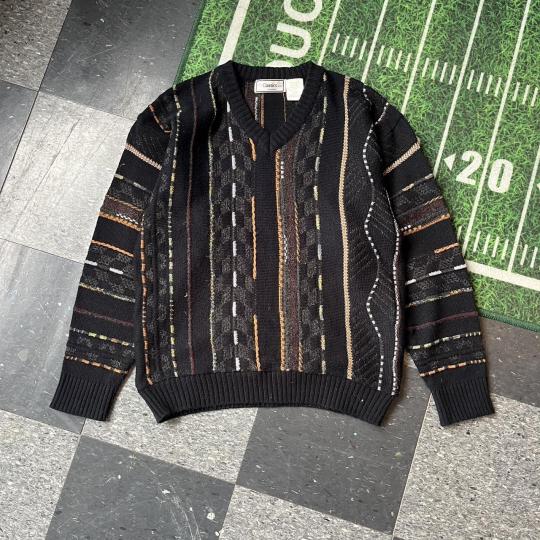

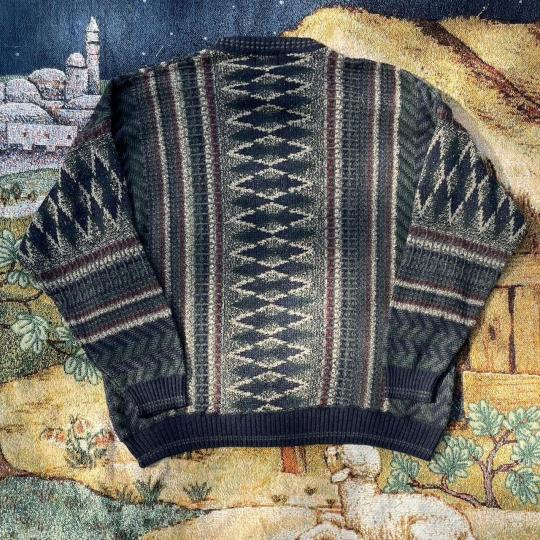
Note: The information about knitting in this post is the result of several weeks of research on hobbyist sites and video tutorials, but I am not a knitter. If I have gotten anything wrong or misunderstood anything about these techniques, please send me an ask! I'm always eager to learn more!
#wwdits#guillermo de la cruz#character costumes#fair isle#coogi#harvey guillén#fashion#plus size fashion#sustainable fashion#mosaic knitting
89 notes
·
View notes
Text
"OUR MUTUAL FRIEND" (1998) - Second Review
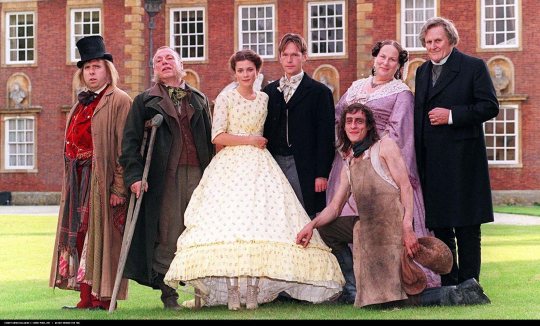
"OUR MUTUAL FRIEND" (1998) Second Review
Several years ago, I had written a review of "OUR MUTUAL FRIEND", the BBC's 1998 adaptation of Charles Dickens' 1865 novel. Needless to say, my opinion of it proved to be mixed. But after numerous re-watches of the four-part miniseries, I came to the conclusion that my views had undergone a tremendous change . . . as the following new review will convey.
During my recent re-watch of "OUR MUTUAL FRIEND", I continued to find it a complicated tale. It featured at least four subplots (and not three, as I had originally assumed). And they all stemmed from the alleged death of John Harmon, the estranged heir to a fortune created by his father, a former collector from London's rubbish. "OUR MUTUAL FRIEND" began with a solicitor named Mortimer Lightwood informing the circumstances on the death of his late client and the details of Mr. Harmon Sr.'s will to his aunt and a group of listeners at a London society party. According to Lightwood, Mr. Harmon made his fortune from London's rubbish. The terms of his will stipulated that his fortune should go to John, returning to Britain after years spent abroad. The will allowed John to inherit his father's money on the condition that he marry a woman he has never met, Miss Bella Wilfer. However, Lightwood received news that John Harmon's body had been found in the Thames River. He and his close friend, Eugene Wrayburn, head toward the river to identify the body. And it was this sequence that led to the following subplots:
*Mr. Harmon's employees, Nicodemus and Henrietta Boffin inherit the Harmon fortune and take Bella Wilfer on as a ward/companion to compensate for her loss, following John Harmon's "death".
*John Harmon fakes his death and assumes the identity of John Rokesmith, the Boffins' social secretary, in order to ascertain Bella Wilfer's character.
*Gaffer Hexam, the waterman and scavenger who found Harmon's "body", ends being accused of murdering "Harmon" by Hexam's duplicitous former partner, Roger "Rogue" Riderhood.
*While accompanying his friend, Mortimer Lightwood, to identify Harmon's body, Eugene Wrayburn meets and falls in love with Hexam's daughter, Lizzie.
*Bradley Headstone, the schoolmaster of Charley Hexam, Lizzie's younger brother, develops a romantic, yet violent obsession with Lizzie and a deep hatred of Eugene.
*Mr. Boffin hires a ballad-seller with a wooden leg named Silas Wegg to read for him. When he finds Harmon's will in one of the Harmon dust piles, Wegg schemes with a taxidermist named Mr. Venus to blackmail the newly rich dustman.
*Mr. and Mrs. Lammle, a society couple who had married each other for money and discovered that neither had any, plot to swindle Mr. Boffin of his money.
I have experienced a handful of movies, novels and television shows in which disparate subplots eventually form into one main narrative. A major example of this was the 2002 novel and its 2008 movie adaptation, "MIRACLE AT ST. ANNA". But I cannot recall any form of fiction in which a particular narrative divides into a series of subplots from one main action or character. When I first saw "OUR MUTUAL FRIEND", I found this narrative device not only original, but rather disconcerting.
The problem I initially had with "OUR MUTUAL FRIEND" was that I only enjoyed only one major subplot - the bizarre "love triangle" between Eugene Wrayburn, Lizzie Hexam and Bradley Headstone. I cannot deny that I found it very interesting and very tense. Yet another re-watch of the miniseries made me aware of the mistakes I had made in judgment. One, my views of the miniseries' other subplots turned out to be more interesting than I had initially assumed. It finally occurred to me how wealth, greed and/or class played major roles in Dickens' story. The Harmon fortune had attracted greedy types like Silas Wegg and the Lammles. Even Bella Wilfer was willing to use the Boffins to find a wealthy husband within London's high society. Gaffar Hexam's discovery of the fake John Harmon's body and the reward he had received led his greedy and jealous former partner to accuse him of murder.
John's deception also exposed a good deal of class bigotry in this tale. Upper-class types like Lady Tippins seemed appalled at the idea of lower-class citizens like the Boffins inheriting a large fortune. She seemed to harbor this attitude that attorney Mortimer Lightwood should automatically take control of the Harmon fortune. As the Boffins' protégé, Bella initially regarded John as beneath her, due to his position as the Boffins' social secretary, John Rokesmith. Class bigotry practically reeked throughout the love triangle between Lizzie, Eugene and Bradley. Despite being in love with Lizzie, the upper-class Eugene seemed more wiling to view her as a potential mistress, instead of a wife. Bradley Headstone, who came from the same class as Lizzie, seemed more than willing to marry her. Yet, he also regarded her as being socially beneath him, due to her lack of education. He seemed to believe Lizzie should be grateful to marry him and reacted with surprise when she rejected his offer. And Eugene not only regarded Bradley as a romantic rival, but also as a man who was socially beneath him. The miniseries ended with Mortimer Lightwood attending a society party aboard a River Thames steamer. He and a shy man named Mr. Tremlow defended a particular marriage that crossed class lines, despite the other partygoers' disapproval and contempt. This ending is one of the main reasons I truly enjoy this adaptation of Dickens' novel. I found it emotionally satisfying, yet very poignant.
Sandy Welch made some changes in Dickens' narrative. Instead of pursuing heiress Georgiana Podsnap and attempting to trap her into marriage with fortune hunter Fascinating Fledgby, Alfred and Sophia Lammles set their sights on the Boffins' money. Welch's screenplay had excluded Fledgby altogether, along with his moneylending business. These changes made sense to me, considering the Lammles' arc with Fledgby and Miss Podsnap had nothing to do with John Harmon or his fortune. The Lammles met a nameless heiress (a stand-in for Georgiana Podsnap?) at a rail station near the end, as they boarded a train for Dover and the English Channel. Due to Welch's erasure of the Fledgby character, she reduced Mr. Riah's character as a close friend of both Lizzie and her friend, dollmaker Jenny Wren. Mr. Riah only played a role by helping Lizzie find a job outside of London.
It seemed a pity that Welch had eliminated the Fledgby character and his arc with Mr. Riah. It would have given the miniseries a peek into Victorian anti-Semitism, something the novel managed to achieve on a small scale. But as I had pointed out - Fledgby and Mr. Riah's arc had no connection to John Harmon, his fortune and his deception. To understand what I am trying to say, let me clarify. All of the other arcs in "OUR MUTUAL FRIEND" either began with Mr. Harmon Sr.'s will or with John Harmon's actions following his arrival in London. The former's will led John to create and participate in his deception in order to judge Bella. If Mr. Harmon had not made that condition for John to marry Bella in order to inherit his fortune, chances are John would have never conceived his deception. He would have never been attacked by the man he had recruited to impersonate him. Hexam would have never found the impersonator's body and found himself falsely accused of murder by his former partner.
Even if Mr. Harmon's will had not changed, John could have simply adhered to and inherit his father's fortune, leading to a possible loveless marriage to Bella. With no body to find, Mortimer and especially Eugene would have never met Lizzie. As Charly Hexam's tutor, Bradley Headstone probably would have met Lizzie and fallen in love with her anyway. But I believe she still would have rejected him. It is possible the Lammles would have focused their attention on John. But I suspect they would have very little success in befriending him. If John had immediately inherited his father's fortune, the Boffins would have inherited one of the Harmons' dust piles. Does this mean Mr. Boffin would have hired Wegg as his reader anyway? I wonder.
I cannot deny that "OUR MUTUAL FRIEND" did such an excellent job in exploring the effects of wealth, greed and class in Victorian London. All or most of the subplots seemed to flow from John Harmon and his decision to fake his death. Like the River Thames that flows through southern England and London. Is it any wonder that Dickens had decided to set his novel along the river - even outside of London? The story began with Lizzie and and her father scavenging along the Thames and ended on that lovely moment when both Mortimer and a shy man named Mr. Tremlow defended a recent marriage that crossed class lines at a society party aboard a steamer on the river.
As for the production values for "OUR MUTUAL FRIEND", I still remain impressed as ever. David Odd's cinematography still strikes me as colorful and epic. I am not surprised that he had received a BAFTA Award nomination for his work. Malcolm Thornton won a BAFTA Award for the miniseries' excellent production designs. His recreation of mid-19th century London and the River Thames struck me as colorful, well-detailed and just outstanding. Mike O'Neil had earned a BAFTA nomination for his costume designs. A part of me wish he had won. I still find them beautiful and a near reflection of Britain in the 1860s, as shown in the images below:
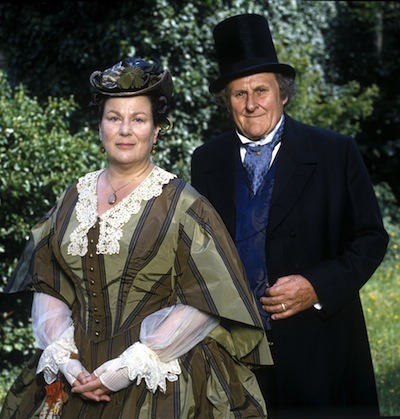
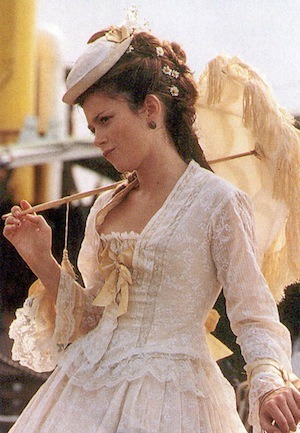
My opinion of "OUR MUTUAL FRIEND" may have improved over the years, but I still have a few issues with it. One of those issues remained John Harmon's deception regarding his identity - namely how it affected Bella Wilfer. I still find it problematic that John did not reveal his true identity to her, until a few months after their wedding. And I found Bella's lack of hostility toward his revelation implausible. Although I found Silas Wegg's attempt to blackmail Mr. Boffin interesting, I found his constant complaints about his target and plotting with Mr. Venus rather irritating after two episodes or so.
The performances featured in the 1998 miniseries more than satisfied me. I found Harmon's gradual love for Bella very interesting to watch, thanks to Steven Mackintosh's subtle performance. And Anna Friel did a great job in developing Bella Wilfur from a materialistic and ambitious young woman, to one for whom love and morality meant more to her than material wealth. "OUR MUTUAL FRIEND" also featured excellent performances from Peter Vaughn and Pam Ferris as the Boffins, Kenneth Cranham as Silas Wegg, Margaret Tyzack as the imperious Tippins, and Dominic Mafham as Mortimer Lightwood. The miniseries also featured first-rate supporting performances from the likes of David Schofield as the no-nonsense Gaffer Hexam, Anthony Calf and Doon Mackichan as the Lammles, Paul Bailey as Charley Hexam, Peter Wight as Mr. Wilfer, Cyril Sharps as the kindly Mr. Riah, Linda Bassett as pub owner Abby Potterson, Edna Doré as the kindly, yet proud Betty Higden; and Robert Lang as the reserved and shy Mr. Tremlow, whom I believe provided one of the best moments in the series.
But there seemed to be performances that I believe stood above the others. Timothy Spall gave one of his more subtle performances as the enigmatic taxidermist Mr. Venus, who found himself drawn reluctantly in Wegg's scheming. Some have complained that Katy Murphy had been too old, as a thirty-something actress, to portray dollmaker Jenny Wren, a character in her late teen or early 20s. But the other two actresses I have seen portray Jenny were either 30 or older, so I do not understand the complaint. And Murphy did such an excellent job in conveying Jenny's emotional, yet blunt personality. I thought David Bradley did a superb job in his portrayal of the sly, yet malevolent waterman, Rogue Riderhood. Unlike other actors in the role, he did not succumb to occasional histrionics.
In my previous review of "OUR MUTUAL FRIEND", I had accused David Morrissey of engaging in histrionics in his portrayal of the violently jealous headmaster, Bradley Headstone. I had been wrong. Morrissey only did it once in a scene that featured Lizzie Hexam's rejection of his marriage proposal. Otherwise, I thought the actor gave a brilliant performance. One would think portraying the reserved Lizzie Hexam would be a walk in the park for any actress. Yet, I believe Keeley Hawes took the portrayal to another level by not only conveying Lizzie's dislike of Headstone, and her wariness toward Eugene Wrayburn's feelings for her; but also her streak of insecurity that led her to doubt her worthiness for someone like Eugene. I had earlier accuse the actress of being unable of to express Lizzie's true feelings for Eugene until the last episode. But I forgot that Hawes did convey moments of attraction toward Eugene. And in portraying a reserved character like Lizzie, she did an effective job of conveying the character's penchant for keeping such feelings closely to her chest. I have said this before and I will say it again - I believe Paul McGann gave the best performance in "OUR MUTUAL FRIEND", for his portrayal of the ambiguous Eugene Wrayburn. If one closely observe the character, he is not exactly a nice man. At least most of the time. McGann did a beautiful job in his portrayal of the indolent, yet patronizing attorney; conveying both the negative and surprisingly, the character's positive traits. And thanks to McGann's performance, one could see Eugene's struggle between his love for Lizzie and his wariness over her class.
Do I still believe "OUR MUTUAL FRIEND" was flawed? Well . . . I point out a few. As I had stated in my previous review, the 1864-65 novel is not considered among Charles Dickens' best works. But my opinion of the 1998 adaptation certainly has improved a great deal over the years. Screenwriter Sandy Welch and director Julian Farino did excellent jobs in translating Dickens' tale to the television screen. And the production not only featured first-rate work from the crew, but also superb performances from an excellent cast led by Steven Mackintosh. If I must be honest, not only has my opinion of "OUR MUTUAL FRIEND" improved over the years, I now consider it one of the best adaptations of any of Dickens' works.
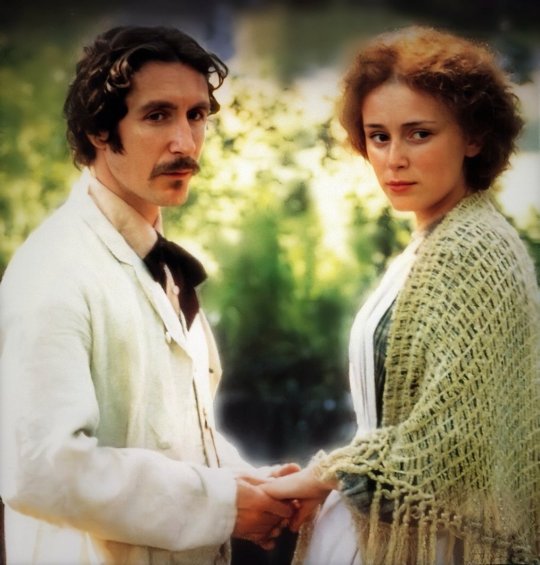
#our mutual friend#our mutual friend 1998#sandy welch#julian farino#steven mackintosh#anna friel#paul mcgann#keeley hawes#dominic mafham#peter vaughan#pam ferris#david morrissey#katy murphy#kenneth cranham#timothy spall#david bradley#paul bailey#peter wight#anthony calf#doon mackichan#linda bassett#cyril sharps#edna dore#robert lang#david schofeld#charles dickens#period drama#period dramas#costume drama
7 notes
·
View notes
Note
Did you have any alternate names for your OCs before you decided on what their final, official name would be? Which OC has gone through the most changes from when you first thought them up?
Siv started out as THE Mary Sue OC when I first developed them in 7th grade. Her original name was Onyx Mariposa Wells and she was a speedster Jedi demigod. It was... Interesting, to say the least. Out of all my OCs, she's probably undergone the most changes.
Here's an old Picrew I have saved from back then and then her current design, I say it's a major glow up.


Hailey's name was originally Tauriel Lokidottir, and she was a Marvel OC from a different fic. She was the daughter of Loki and she was the goddess of redemption. She was also OP as fuck, which she still kinda is, but it's because she's dead, not because she's a literal goddess.
Cassandra was originally a Marvel OC, and she was Nick Fury's adopted daughter and the bastard sister of T'Challa. Needless to say that got adapted out.
I kinda just made OC soup with all the characters and adapted them to fit my personal canon and that's that, I guess. Most of my other OCs are too new to have had major name/story changes.
#most of these OCs ive had for like 5+ years#ask revan#oc shit#siv thawne#hailey laurence#cassandra stevens
5 notes
·
View notes
Text
The Angel Of Death ("Thrasher" 's Story)
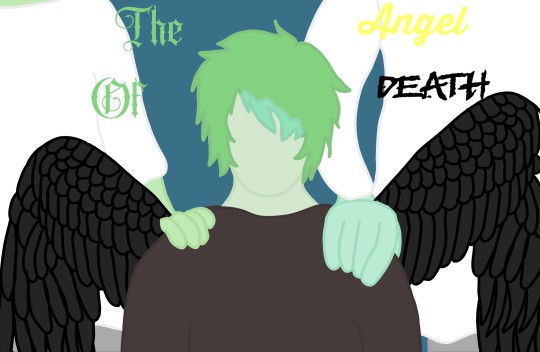
AN- Please know that this, though being a backstory, will be a bit of a spoiler for both the original Long Live Nock, and especially for the eventual new version. As Thrasher is a major character in both, and this will make a lot of this boy’s story parts less surprising. Also, reading the warnings will give spoilers as well (but trust me when I say, you WILL likely want to read them as this story gets very very dark) so please be aware of that.
Also, I had a lot of technical issues on this, including not being able to upload the font I made for this to Tumblr so instead just taking pics, a video in this for some reason I could not crop correctly-
I refuse to work on this anymore so it is what it is lol.
Other than Copper, this is my most anticipated backstory. He has undergone a hell of a lot of character development since his first introduction, so much that honestly he is pretty much not even the same character.
Be aware, I consider his backstory the darkest out of everyone’s, so this is not for the faint of heart.
~~~~~~~~~~~~~~~~~~~~~~~~~~~~~~~~~~

A shape shouted in an olden language, that was long supposed to be forgotten to all but the ancient sage’s.
10 Pure’s in white robes stood around a table, the sound of screaming clear as they chanted. For hours they had been doing this, as a lady huffed and pushed.
As the cry of a baby filled their ears, their chanting stopped as they rejoiced, the green hair and skin like emeralds to them. The father stepped up, grinning as he held onto his wife’s hand. Small black dove wings were curled around the baby as they spread a vial of blood upon his head.
“Welcome to the world… our little angel of death.”
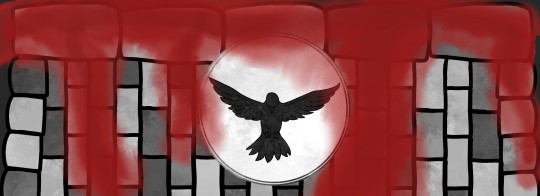
~~~~~~~~~~~~~~~~~~~~~~~~~~~~~~~~~~
The young kid looked around his small room, sighing weakly. His name, Razor, son to the most loyal followers of the cult leader ; to [ , Cruci and Laplace.
He had been training constantly for years for… what he didn’t know. His parents just wouldn’t tell him. He hadn’t been able to go to school, wasn’t allowed to see other shapes not in the cult, and was constantly being forced to his limits. When he peeked over the fence and saw the kids playing and laughing, he couldn’t help but feel envious.
He didn’t understand why he was so different…
At 7 years old he was brought to meet the leader of the cult… Lady Marlene.
She looked at him with a look he couldn’t decipher, being just a bit younger than his parents. The look, he didn’t like, he didn’t know why- “Ah, my loyal followers, how goes the training?” “Wonderful my queen, we thought it was finally time for Razor to meet you.”
The lady’s eyes traveled across him, making the young one shiver uncomfortably. “Perfect. I would like time to check on his training, his holiness, and deliver his first… rune.”
They both bowed to say of course, lightly pushing Razor forward. He didn’t understand what that all meant, and he was terrified to find out. Why, he didn’t know. He slowly took her hand, though not wanting to, her leading him into what seemed like a bedroom fit for royalty.
“You should feel honored my dear, not everybody gets the chance to be this close to me.” “… U-Um… o-ok?” He didn’t know what to say, but with her expression very lightly 'souring he was sure he didn’t say it right. “You don’t understand what your future entails do you? You stupid kid~”
Her grip tightened right before Razor attempted to step back, him whimpering lightly. “I-I’m sorry- please let g-” He let out a cry as her hand collided with his face, the grip keeping him from falling. “YOU are destined to be my King, that means you have to get used to me.” The words made him fearful. King? She also sounded, angry, and there was a tone he didn’t understand nor like.
“Now, we have a major thing to do.” She walked into the closet, grabbing a strange box. When she opened it, his heart started beating quickly, seeing multiple strange metal symbols. “I think your old enough to be known as mine~”
He didn’t know how long he was in that room, screaming as the metal sizzled around his skin, in pain, crying and horrified as she did things he didn’t understand.
When he woke up again, his left leg felt like it had been through a house fire. He cried, trying to call out for his parents.
…. No one answered. He was left alone, with a new fate written out for his eyes to see.
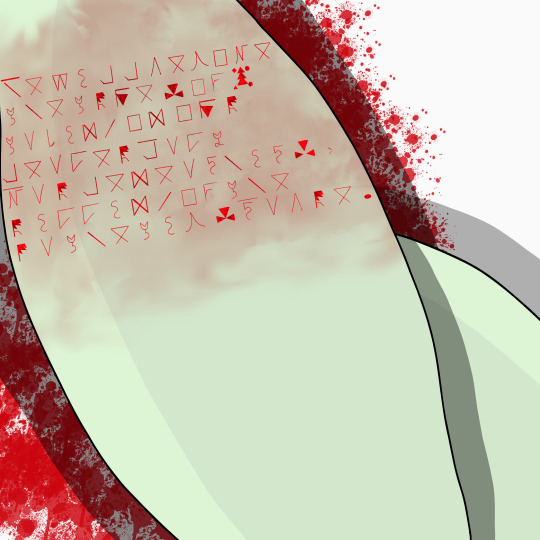
~~~~~~~~~~~~~~~~~~~~~~~~~~~~~~~~~~~~~
Less than 3 years later, on his birthday he slowly opened his eyes, hearing the pitter patter of footsteps coming up the stairs. Today would be the day, he was supposed to find a hero’s tattoo somewhere. He couldn’t help but be excited, which hero would he be? Water, Earth, Nature, Sky? He heard his door open, him quickly sitting up in bed.
“My dear, are you ready to see your fate?” Razor nodded, heading to the mirror.
None on his face or neck, so he lifted up his shirt. Nothing, next he checked his legs.
… There was nothing. No tattoo… His parents didn’t take it well. They lost it, blaming him, saying he must’ve done something wrong. He cried out begs and sorries as he was beat into a bloody mess. When they finally left to tell the cult the news, his room was ruined, his body bloody , and his spirit broke.
He did something wrong… Like always. It always seemed to be his fault. He wished he knew what to do.
~~~~~~~~~~~~~~~~~~~~~~~~~~~~~~~~
Breaking news.
The 1st known hero, Copper and his family has gone missing, along with his boyfriend Aero. If you have any information, please contact General Loga.
The headline of the newspaper was super surprising for Razor, especially since he hadn’t seen his parents in a couple of days. He tried again looking around for the two, shooting up hearing the door open. He walked over, his face paling seeing them covered in blood. “Razor. Grab a backpack and fill it with the essentials, now.”
Their tone scared him, but he did what he was told. He overheard them talking, making it clear to him they were the reason the Earth hero had gone missing. They had tried to kill him the usual way heroes were killed, ridding of all their reasons of living, and their hope.
… But he was still alive. Something was different. His heart beat quickened at the thought, but he had no time to think as they forced him out the door. They walked through the streets, his jacket keeping him hidden from the world. He cried as they suddenly threw him into an alley, his head smashing into the ground.
“Now, your real training begins.” Was what he heard as he slowly tried to get back up. When he looked up… they were both gone.
“…Mom…? Dad?” No answer made his heart pound, as he again called out for them, close to crying. He had never been outside on his own, or anywhere other than his backyard, training grounds and the cult place. It smelled horrible, was filled with creepy sounds, and felt cold-
With no one answering, he curled into the corner, sniffling his hands wrapped around himself.
Real training.. he was scared to find out what that meant.
~~~~~~~~~~~~~~~~~~~~~~~~~~~~~~~~~
Razor had been walking throughout the forest for days, feeling more and more hungry and thirsty. A cigarette in hand to keep him calm, he smoked anxiously wondering what he was supposed to do. He had no idea why he was out here… but he sure knew he was getting weaker and weaker. His legs were feeling like they were made of lead,
Unsurprisingly, it wasn’t long before he collapsed, his vision weak. Before he passed out, he looked up, noticing someone staring down at him.

~~~~~~~~~~~~~~~~~~~~~~~~~~~~~~
Razor sure wasn’t expecting to wake up warm and comfortable, but it was a nice feeling. He slowly opened his eyes, growing confused. He was in a bed in a house he didn’t know… And he could smell food near him.
The house though, smelled strange. And was rather od and beat up.
“Hey kid, glad to see your awake.” He quickly looked over, seeing the older shape that he passed out to. He lightly backed up, before being calmed down by them. “It’s ok, not gonna hurt ya. My name’s Deviance… I’m sure your hungry.” He slowly ate, feeling himself relax, it being strangely really good.
“Where… am I?” “Let’s, call it an abandoned house for now-
… I was called to find you by your parents… You don’t deserve to have to go through this kid.”
Razor didn’t know what to say to that, tensing as the other wrapped their arms around him. It didn’t take long after he realized it was just a hug to bury into it, trying to register all that had happened.
After a few days of getting his strength back, he was shown around his, apparently new home. It seemed to be, well simply a crack house- But… despite that title strangely, the shapes inside seemed nice. They all said hi, them playing around while they worked… it was better than anywhere he had been.
Now he had his own bedroom again… but he was still sure it didn’t mean any big difference between what was waiting for him when the cult wanted him. He wasn’t ready for more pain and training… but he didn’t have much of a choice.
~~~~~~~~~~~~~~~~~~~~~~~~~~~~~
Come him being 15, his body was almost fully covered in runes, he had became the leader of the crack house now that Deviance was old and “retired”. Well, kind of, the other still ran everything mainly-
Razor now though, had found about the horrors and wonders of addition, becoming an alcoholic, drug addict, and nicotine addict. He loved being able to feel numb, though he did things he never remembered or wanted to do while the poison rushed through his veins. Seeing Copper though, that was the biggest shock of the past year. Him, Klay and Swarm had been the ones to see him, apparently they beat him silly after he knocked one of his teeth out. Luckily their healer, Shaku was easily able to fix it, still hurt though-
He found himself walking through the forest late at night, per usual, smoking his 5th cigarette today. He was interrupted by his train of thought though… by a soft meow.
He looked around in shock, a cat? Even if it was a cat based shape, that sure as hell wasn’t common. He quickly began looking around, the meow sounded so young. The meowing luckily was easily able to find… and it lead him to the smallest and most beautiful white kitten.
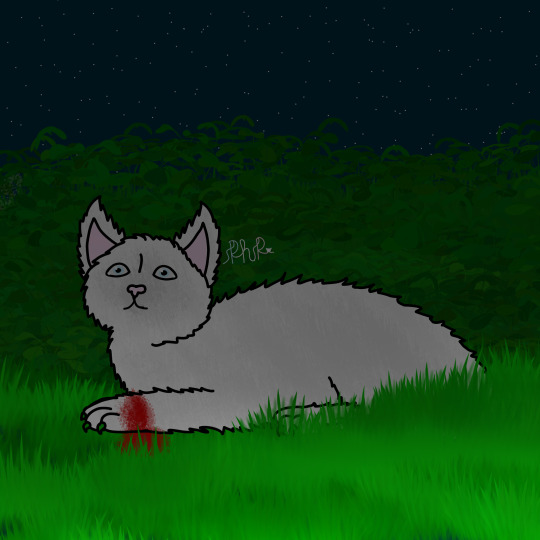
“Heya sweetheart…” The pained meow hurt his heart, slowly leaning down as they limped over. Seemed to be a girl, no collar, so most likely no owner… He carefully picked them up, beginning to walk home. Once they were healed, he softly cleaned them, their purrs making him feel so happy. “I’m going to need to give you a name sweetheart…” They meowed happily curled up on his lap, him smiling as she purred.
“… I got it. Snowball?” “Meow!” He laughed as they nuzzled and licked his cheek, him petting her. “Snowball it is.”
~~~~~~~~~~~~~~~~~~~~~~~~~~~~~~~~
The sound of chanting was clear as he covered his ears, shaking in pain and general exhaustion. He had finished his last rune… but that wasn’t why he was terrified. He knew what was happening outside of the cell he was in, the corruption. They were praying for the corrupteds to be dealt with. He was terrified of not knowing whether his family (Not the piece of shit mom and dad he had, he hadn’t seen them since they abandoned him) and little kitten were ok, not knowing what was happening outside the stone walls he was stuck in.
He heard footsteps approach him, each step making him terrified. He knew those footsteps. And he knew damn well what they brought with them.
“Ah my King~ Glad they have finally finished painting your body~” He tried desperately to back away, his heart beating quickly. Marlene’s hand grabbed his chin, fingernails digging into his skin as she ran her other hand across his cheek. He hated this. He hated being so… helpless to her. So easily controlled…
As her hands travelled down, tears ran down his face, knowing there was nothing he could do to stop this.
He could feel his hope fading, it obvious to him that his fate would be everything he didn’t want for himself.
~~~~~~~~~~~~~~~~~~~~~~~~~~~~~~~~~
The next 8 years passed by in a blur, his addictions the only thing keeping him sane. He didn’t know what he did in those moments he didn’t remember, he didn’t know he was attacking Fresh, he hadn’t known he beat up Copper as a desperate trying to pass the blame he felt for himself. All he knew was the few moments he wasn’t drunk or on drugs, of misery and pain, exhaustion, and emptiness.
Now though… He was in front of a King. Nock, the king of corrupteds in the forest. His stare was deadly, his stance and energy filled with so much menace and hatred he felt it could rival the Corrupted Lords.
“HoW AbOUt WE hAVe A LiTTlE ChAT?~” ‘Does he think I’m dumb??’ He said, well what any smart shape would, no way while quickly walking away. But… they said something that immediately made him stop.
“i MaY HaVE a WAy TO hELp YOuR “PrOBlEM”.” He quickly looked over, the look on his face… He knew it was dumb.
But god was he desperate to change his fate. To have his own life. So, he slowly nodded, following the other. They sat down at a table, Nock offering a drink. He knew it probably was dumb to drink, but with his alcohol tolerance he doubted one drink of anything could get him drunk. So he acceoted.
… All it took was one sip.
And Nock had him wrapped around his finger, corrupting him to his will.
“aNGeL Of DEaTH, I HAvE ChANgED yOUr FAtE. NoW…
YoU WiLLbE KnOWn AS cRUsADeR.”
~~~~~~~~~~~~~~~~~~~~~~~~~~~~
AN- And it’s finished! This is the last backstory I had planned, next will be… the remake of Long Live Nock. I’m really glad to finally have been able to tell these stories, also there probably will be some extras for these two backstories posted later.
Hope you all enjoyed!
(Also I will be posting an extras post for the two stories-)
#jsab#just shapes and beats#jsab’s#thraser#long live nock spoilers#violence tw#child abuse#child abuse tw#grooming tw#pedophillia tw#rape reference tw#csa tw#sa tw#sa mention#rape tw#abuse tw#blood tw#drug ment tw#smoking tw#Deviance#Snowball#kitty#Copper#Lady Marlene#Cruci#Laplace#religion#religion tw#religious trauma#sacrificing themes
2 notes
·
View notes
Text
Soul Eater Weapon/Meister crossover pairings I'd like to see
G Gundam:
Kyoji/Schwarz in any arrangement. Assorted ninja weaponry, like Tsubaki. Would probably have to be a twin AU or need to mix the settings.
Chibodee gang. All of them can keep their backstory without major changes, ie. the girls being troublemakers until they and Chibodee mutually adopt each other. This becomes convenient because with a boxer they can get into combat with three of them transformed instead of two.
The group rely on numbers to begin with in order to overwhelm opponents, but become extremely powerful once they develop a deep mutual respect (like how Kid, Liz, and Patty work).
Obvs the girls' weapon forms are glove+glove+pistol+pistol, and Bunny makes sense having a pistol form, but I can't decide whether to have the mechanics (Shirley, Janet) have the same weapon form or whether it makes more sense for the physician (Cath) to turn into a punching weapon and tip off her partners on where to aim.
Weapon!Marie-Louise, wanting to get into fights and dig up dirt, is beside herself when her father forbids her from finding a partner and training as a weapon; she ends up going straight to George and demanding he become her partner instead of just her protector.
Meister!Nastasha and Weapon!Argo become a team when their home country becomes besieged with demons; Nastasha is supposed to make sure Argo remains in the custody of the Russian government, but over time she finds that he is far more trustworthy than her employers.
Weapon!Domon with a strong preference for being the wielder runs away from home to learn to fight with his non-transformed, human body. Master Asia as a retired Meister with a dead/absent partner who teaches Domon to amplify his own soul wavelength rather than asking him to transform.
Meister!Allenby having undergone experiments with the black blood carrying an out-of-their-mind berserker weapon inside of her. Preferably the two of them actually manage to get some help and manage to coexist in the end (probably after being abducted by and beating the snot out of Wong). Actually being able to re-contextualize Nobel Gundam as more of a character would be pretty cool and of all the gundams in G Gundam I'd probably pick her for this AU.
Gurren Lagann:
Sword/Drill!Kamina and Meister!Simon. This would probably be a kinder AU to both of them than their original setting. Kamina is probably a highly desirable partner in this setting because of his ability to hype up his partner and boost their power, but he insists that Simon is the most special and won't team up with anyone else for more than a bout or two.
Steven Universe:
This Weapon!AU can pack so much angst into it.
Pearl probably has similar-to-canon issues with shapeshifting but with her weapon form.
The diamonds are all witches. Similar levels of questionable morality and betrayal are abound.
Steven is noted to be really weird because he appears to have death-scythe kinds of powers really shortly after he even expresses weapon tendencies.
Meister!Connie.
There are probably at least 3 ways to approach Garnet in this kind of AU but my favorite is that somehow Ruby and Sapphire manage to Jaeger the fuck out of some kind of magical construct.
Greg is still just a dude who makes music. He probably writes a song for Spirit encouraging him to be a better dad. Hell, he probably convinces Maka to hang out with her father on the condition that Greg chaperones.
#I started this in the tags of another post but I need it on its own.#Soul Eater#crossover#anime#G Gundam#Gurren Lagann#Steven Universe#AU Fun#Headcanons#if anyone's going to pick a fight do it off of my post m'kay?#I don't want to hear it or find out about it#I would be interested in seeing Soul Eater AU ideas for other peoples' favorites though.#the setting is absolutely wild and incredibly goth and I need more of the fantastical elements and interactions
6 notes
·
View notes
Text
What We Do In The Shadows / review.

This is just my opinions on the first four seasons of What We Do In The Shadows. Pretty much spoiler free.
I started watching this show last year but never really got into them until the end of the first series which I finished at the start of the new year. And haven't been able to stop since. Of course, I know the original concept through the movie the show is based on and have been meaning to watch the shows for a long time, but never really got around to do it.
And this show, in it's short sitcom format, has gone by at a lightning fast pace that never really seems to take any major missteps, even after four seasons, but rather only seems to develop more and get stronger as the writers and the cast understand the world and the characters better. There is a good spark in the group that translate to the screen.
There is a lot of humor going on at all times; quite sarcastic, witty and dark. It's not for everyone, but I have a lot of fun watching it. There have even been several moments where I have laughed out loud - which is not something that happens very often. And there are a lot of moments that are endlessly quotable.
But despite the darkness of the vampire world and the dark, crude humor that is present within the shows, there is definitely a lot of heart there as well and it is a sweet and comforting watch. There isn't a character that I find boring or a dynamic that I don't think works and I really enjoy their approach to this vampire world and how our understanding of it through our pop cultural views of vampires is used to amp up the humor.
What We Do In The Shadows seems to know perfectly what it is and is not trying to be anything more than a mockumentary about vampires in our world, and it's really does that in a really charming way without being too excessive or trying too hard. It's silly, there are vampires, but that's also the point of it all. And they embrace the silliness.
It's usually a bit common with shows like this, in my opinion, that the characters don't change very much within the framework of the show. While each series has its own story to tell and the characters learn something before that story wraps it usually starts again with a clean slate in the next season, with some lingering elements from the previous ones. It is that way so that the dynamics of the shows and the characters stay relatively the same and the jokes work. But it works well for these sitcoms, and especially well with this show because these are centuries-old vampires and they're not exactly supposed to change too much. It does not make the story too stinted.
It's not that What We Do In the Shadows hasn't undergone any changes throughout its series, because all stories have to develop in some way or else they become too stagnant and convoluted and just don't work anymore, but the changes are subtle and small. They don't necessarily have too much influence on how the characters behave, so that the jokes and all that work. It can be a bit repetitive at times, but the shows are still always fun to watch. And that's just the sitcom format are, so I don't feel like I can give fault the show for that.
The characters still feel like the characters from the first season, but a bit changed with more inner emotional life within them as we see them interact more with Guillermo, which is the human perspective and the kind of emotional angle in all of this. And shows like this need those types of characters like Guillermo, who is our main character and the one that goes through most of the big changes, to bring out the the more human elements of the show.
The characters are all so colorful, powerful and unique in their own way, but they work very well together despite how different they are. As all sitcoms should be. It's just a really good sitcom formula going around. Everything just works out.
The series spends a lot of time looking at what it means to being immortal, which is not a new theme to explore in a show with a supernatural twist, but it's done in a very earnest and clever way and manages to do it over and over again without being too corny, or repeated. Probably because each character is really lovable in their own way, so we just care about their coils.
There have been times where it appears like the show is not quite sure what to do with all of it's characters and they kind of run in circles around the others who have more going on each season, but even if they take a few steps back with those characters they work well as a whole as this weird little vampire family that it hardly matters. The diversity of the cast is great and it's all done with such sincerity and dark humor.
Maybe the shows could do with taking a bit more risk at times, but each season does come with a way to challenge itself in one way or another. This is light and fun TV that manages to have humor, heart and a little action in this dark, but cool vampire world that is still filled with sincerity and love. I often find myself rather moved by all the different relationships and dynamics these not-so-human characters have and how much they mean to each other.
2 notes
·
View notes
Photo
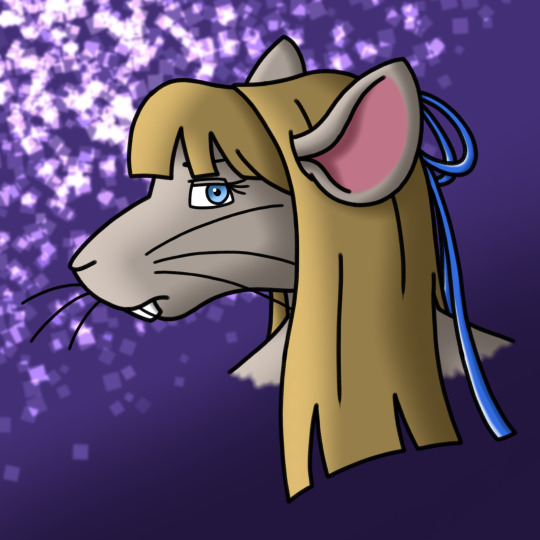
3/17/23: r/SketchDaily theme, "India." Ganges, with an unintentionally creepy person.
...
This week's character from my anthro WWII storyline is Edelgard (no last name ever given). She's a newer character who never appears in the main story but plays a big role in the history of one of the major characters. There'll be more about her later in my art Tumblr and Toyhou.se.
TUMBLR EDIT: Aside from one brief mention in Godfrey Klemper's updated entry, you'd have to go to my Toyhou.se to see whose name Edelgard's resembles, another character given only a first name and whose last name is never given. He's developed quite a backstory--and a future story--since I last described him, and Edelgard here plays a massive role in it, despite being long gone and presumably dead by the time the main plot takes place. Her character, despite existing only a brief time so far, has already undergone massive changes--including a sex change. (No, not within the story--originally her character was male, then I wondered how different the plot would go if she were female, and it abruptly happened.) It's yet another disturbing tale in a plot full of them, I realize, but yet again, here we go.
Let's set the scene, which is still heavily in development so may still change. In the current story, various units of the Wehrmacht which patrol the countryside often stop to rummage through abandoned houses for goods since the supply chain is frequently fractured. One of these units is PFC Klemper's, under the command of 2nd Lt. Frieder Dasch. Klemper is a child soldier who grew up dirt poor, working early on on a farm, and was orphaned young as well; he knows how to scrounge and provide for himself. So he knows, from a quick peek inside, which houses have the good stuff. Dasch often sends him in first to see if the effort is worth it. One day, the unit crests a rise and is surprised to see below them at the edge of a vast clearing near the woods not a house, but a castle--a veritable castle. Sure it's short and boxy and nothing like the castles in picture books, but still, aside from Castle Schavitz it's the first castle they've come across, right in the middle of nowhere, too. They know of no castles supposed to be in this area yet here one is! After a few moments of puzzled speculation, during which they observe it through binoculars and conclude it must be abandoned, they decide to go down and check it out. Maybe there's something good inside.
Accompanying the unit is 1st Lt. Ratdog, a sniper whom Klemper has been assigned to watch; when not busy sniping ¯\_(ツ)_/¯ he sometimes travels with them, since he and Klemper, who've grown close, are often separated for weeks on end. He's as surprised to see the castle as they are, but seems strangely dismayed as well; Klemper notices his reluctance to approach it although he goes along. No smoke rises from the chimneys, plus, oddly, the windows and doors have all been left open. Result, the elements have gotten to the place, with the interior being quite worn, damp, and unsuitable for longterm habitation. Ratdog sits on a mouldering couch in the main hall while Klemper ventures up the great staircase and the others mill around curiously. Dasch notices a large portrait of a couple in Prussian noble dress over the fireplace, but the faces have been damaged. There's an engraving in the wood above the mantel and he brushes off the dust; he reads aloud, "'Herr Herzog und Frau Herzogin von...'" but the surname is gouged out and unreadable. All he can tell is the castle once belonged to a Herzog and Herzogin--a duke and a duchess. Whoever they were, their name is now lost to history.
Upstairs, Klemper rummages through the living quarters; he finds nothing much worth salvaging aside from a child's toy--a carved wooden horse, which he tucks into his coat--but is quite curious about a pile of portraits he finds at the end of a hallway. Just dumped there after being pulled from the walls. He looks through them in the hopes of learning about who once lived here. Some of them are what appear to be family portraits--a mother, a father, two children--but, creepily, the faces of the parents are all destroyed. The children are a younger boy and an older girl with long straight hair, both of them unsmiling. Klemper tries to push down his unease though it's difficult the more he looks. As he browses, the children in the portraits get older, until finally he digs out one where the girl looks almost grown, the boy perhaps in his mid teens. And Klemper drops the portrait, eyes wide, and pushes himself to his feet. He runs back up the hall and down the great staircase to the ground level where everyone else is milling around.
Klemper stumbles into the main hall so abruptly that everyone looks at him. Dasch asks if he found anything useful; he says no, he didn't. Dasch decides that they'll sleep the night there, since at least it provides adequate shelter on a dry mild night, and they'll head out again in the morning. Everyone gets out their bedrolls and they start a fire in the fireplace, settling down to eat and talk a bit before turning in. The next day, as planned, they head out again, leaving the castle behind.
Ratdog notices Klemper giving him a furtive look now and then, but neither says anything.
It isn't until later on, when they're alone, that Klemper pulls out the little toy horse and shows it to Ratdog. Ratdog blinks and actually flinches back a bit. Klemper hesitates before venturing, "It used to be yours...?"
An aside, now. When they were still getting to know each other, and on rather poor terms yet improving, Klemper had asked Ratdog his real name. Ratdog had replied, "It doesn't matter. I'm the last, it dies with me." Implying it must be some kind of old, rare name. Klemper said, "What's your first name, then?" to which Ratdog paused but then said, "Adel." Klemper henceforth refers to him by his real name, Adel, and is the only one to do so until after the war (when most of the characters drop his wartime pseudonym and refer to him as Herr Adel).
Now...when I chose a real name for Ratdog, I don't believe I put much thought into it aside from it being German, and sounding good. I likely looked up the meaning and thought that was cool too, but it wasn't why I chose this particular name. This is my way of saying I had NO idea about this future plot point when I named him...but it worked out in an odd way.
"Adel" isn't just a name. In combination, Deutscher Adel, it refers to the old German noble class: The barons, the counts, the dukes. (Adelina Dobermann's name is from the same root word.) "Herzog," duke, is almost as high a noble rank as somebody can get without being a literal prince. The name and faces of the duke and duchess of the old castle were wiped out, but the portraits of their children, the young Herzog and Herzogin, survived. Klemper has no idea who the girl is, but despite being only a teenager in the image, Ratdog was easily recognized. Ratdog isn't just a Junker, he's the last of a long, ancient line of dukes, and that was his castle.
In one part of the story, a Nazi official offers to put together Klemper's family tree; he manages to do so from the names of Klemper's late parents and gleefully proclaims that Klemper is of pure Aryan blood and comes from "a long, proud line of peasant farmers." Klemper isn't impressed either way. Ratdog turns down the same offer. Klemper now wonders if this is why; he doesn't want anyone to know he's a duke? Ratdog asks if this changes anything between them--he's the exact opposite of Klemper, and maybe a hundred or so years ago, somebody just like Klemper would've worked his fingers to the bone on Ratdog's estate. Klemper says it doesn't matter. He's curious why Ratdog would want to hide such information, though, and why he apparently abandoned that life. Because as long as Klemper's known him, he's lived alone in the woods in a tiny stone cottage he built himself. Why would he give up a castle? What happened to all the portraits and the family name? And most of all, what became of Ratdog's older sister? For that's obviously who the unknown girl in the portraits must have been.
Ratdog is just as obviously quite reluctant to share his story with Klemper, but the two of them are learning to be honest with each other, and this is a pretty big thing to not be honest about. In bits and pieces he tells Klemper his story.
His family of dukes and duchesses had lived in the castle for generations, hundreds of years. The farmland around the estate, and the number of people working for them, dwindled more and more over the years so that by the time of his grandparents, it was pretty much just them and their son and daughter. One winter day the older duke and duchess went off hunting in the woods near the castle and didn't return by evening. A snowstorm passed through, so it wasn't until the next day that the younger duke could finally go out searching for them. He returned home emptyhanded. The only thing he and the younger duchess could assume was that they'd been caught in and succumbed to the storm. Later in the following year, he would indeed find two scattered sets of bones inside a cave in the woods where they must have tried to seek shelter, but most likely froze to death in the cold.
Now it was just the younger duke and duchess living in the castle. Although there was a distant neighbor here and there which they could trade with when necessary, aside from that they were on their own; the duke knew how to hunt, so he could provide for them, though it was quite a lonely, isolated existence. They eventually had a daughter--a new young duchess--but from an early age it was obvious something was wrong with her. She was prone to extreme violent fits which her mother couldn't handle, ending up locking her in her room for extended periods. Her father tried to get through to her when he could, but didn't do much better. He disagreed with the duchess's decision to lock their daughter away, but without anyone else to help calm her down, there was little they could do.
After several years they had another child, a son. He didn't share his older sister's violent temperament, seeming every bit a normal, healthy child, and his mother doted on him. One day when wandering the castle unattended, he discovered a locked door and managed to get inside. By the time the older duchess realized he was missing, and tracked him down to the room where his sister had been confined, the girl already had a scissor blade pointed at the boy's neck.
The duchess's screams brought her husband running and they both stood and stared at their daughter, holding their young son with the weapon at his throat. No amount of begging and cajoling would convince her to let him go, until the boy looked up at her. Unlike his parents, he was too young to understand the seriousness of the situation, and so wasn't afraid. Seeing him looking up at her, the girl let him go. The duchess grabbed her son and pulled him away and the tense standoff ended.
The duke asked for the scissor blade and held out his hand, the girl lashing out and gouging it open; when he held out his other hand, however, instead of getting angry with her, she finally relinquished the weapon. He refused to lock their daughter away again--the way she'd reacted to her brother proved, in his mind, that she wasn't entirely broken. Surely they could help her. The duchess didn't want anything to do with her for threatening their son, so he took it on himself, finding her some decent clothes, washing her up, brushing and fixing her tangled hair; before long, she looked like any noble child any family would be proud of. He tried to spoil her and pay her all the attention he could, but it didn't seem to get through to her much; a few times she would hold her arms out to her mother and make noises indicating she wanted to be picked up, but the duchess refused. A chill fell between them and they never grew close, though she did grow close to her younger brother, who would often keep her company and play with and read to her. He didn't seem terrified of her like their parents were.
Klemper stops the story and asks the question that has to be obvious by now: The only people who had been living in the castle were the old duke and duchess, and their son and daughter. The older couple had disappeared into the storm. Now, there's a new duke and duchess, and their son and daughter. "This girl and this boy, this is your sister?--and you?" When Ratdog confirms it--these two children are himself, Adel, and his sister, Edelgard--Klemper then furrows his brow and says, "Then, your mother and your father...they were...?" Ratdog confirms this, as well: His mother and his father were brother and sister, the children of his grandparents. It's never stated outright, but the implication is that his grandparents were also siblings, and who knows how far back this particular arrangement goes.
Klemper then has to gingerly ask: "You and your sister...?" Ratdog shakes his head--no, the two of them were never a couple; although they were likely expected to be, they weren't interested in each other that way. It's obvious now why he didn't want his family tree made out; he again asks Klemper if this changes anything between them. Klemper replies, "It's...odd...but odd things happen out in the country." He would know. Ratdog theorizes that this long family tradition may have contributed to his sister's fractured mental state, though he isn't sure why the same didn't happen to him. Does Klemper want to know the rest of the story? He nods, so Ratdog continues.
Despite their father's, and his, best efforts, his sister was never quite right, and the resentment between her and her mother only seemed to grow over time. Whenever Adel and his father left the castle to go hunting, his father teaching him everything he'd need to know when it was time for him to take over, this left Edelgard at home alone with their mother. The two simply tried to avoid each other as much as possible. Privately, Edelgard would confide in Adel her feelings about their mother, and they were dark ones; he tried to reassure her, but wasn't sure how. The older the two of them grew, the more strained the situation became.
One day Adel went out hunting alone--he was old enough now--while his father remained behind to tend to their mother, who wasn't feeling well. Edelgard of course remained home as well. It was late by the time he returned, puzzled by how silent the place was; sure it had never been noisy what with only the four of them there, but there should have been voices at least, or dinner on the table. He grew uneasier the longer he looked around, but there was nobody on the ground floor; so he went upstairs where the living quarters were. When he reached his parents' room, he finally found his mother, still in bed, but now drenched in blood; his father was slumped on the floor beside the bed with blood pooled around him as well. He panicked at first, trying to wake them, then realizing they were both gone--then breaking down sobbing--then gasping and cringing back when something moved in the corner of the room. Edelgard was there, her own clothes soaked red, though she wasn't hurt. She still held a long, dripping hairpin in her hand.
When he asked her what she'd done, she hadn't much answer, aside from the ever-present enmity between her mother and herself. What about their father, though?--he'd never rejected her, he'd only ever been kind. Why would she kill him, too? Edelgard's eyes grew dark when she described how he'd reacted upon coming into the room in response to his wife's screams. "He called me 'monster,'" Edelgard said quietly, and that was bad enough.
For a few moments it looked as if she would turn the hairpin on him as well, but when he didn't turn on her the way their father had, she faltered. Instead, she advised him to take what he needed, and leave the castle--"Before I hurt you, too. It's only a matter of time, anyway." Despite the horror of the situation he was reluctant to leave her, but had to do so when she started screaming at him in a rage; he hurriedly rifled through the family's belongings, fetched a few things, and fled. Over the next day or so he visited a distant neighbor who was willing to help him settle some monetary issues and trade him a few things he needed; he intended to return to the castle, but a heavy snow fell, delaying him from doing so. When he did return, he found the castle almost exactly the way Dasch's unit found it, with the doors and windows cast open, snow drifting inside and piled into corners and dusted upon furniture. His parents' bodies were gone, as well as Edelgard. After searching the castle from top to bottom he ventured into the woods, calling for her, but there were no prints to follow, nobody to be found. He lingered nearby for a bit, but nobody ever returned to the castle, and so he finally left it, and his name, behind for good.
"You never found her?" Klemper asks. "Alive or dead?" No, Ratdog isn't even sure if Edelgard is dead, though he assumes that, like the grandparents they never met, she simply wandered off into the snow. He himself wandered around a bit before picking a secluded spot to build his own home, where he's lived ever since, when he's not staying in the city. Klemper, who had previously mocked the tiny stone house more than once, refrains from doing so again--now that he knows why Ratdog built it and what he left behind--and instead asks, "Why do you think she ran away? You never hurt her, she never hurt you." Ratdog shrugs and says, "I think maybe she felt she was just too broken and didn't deserve to stay with me. Or that maybe it was just inevitable I'd end up hurting her, too."
Klemper says nothing this time. He's had a very rough life, has been chewed up and spat out more times than he can count, and although he's only around eighteen when he and Ratdog first meet, he's lived through way more awful experiences than anyone should, and it's left him bitter and dysfunctional. Although he wants more than anything to matter to someone else, all he ever seems to end up as is a victim, and by now he just assumes he's too broken to be fixed, he doesn't deserve love, and everyone, Ratdog included, will just hurt him anyway. Ratdog's proven he means it when he promises Klemper he'll be there for him, repeatedly, but Klemper's just been through SO much he can never entirely believe him. Ratdog's description of his sister suddenly hits home hard and he realizes why her story resonated with him. Although their circumstances were quite different, some of the fundamentals are the same. Ratdog's patience dealing with him and his mental instability is because he's already dealt with such a thing, in his own family. Ratdog can tell from the way Klemper falls silent and looks away that this has just struck him, yet he too says nothing.
I believe at some point later in the story Ratdog's true status somehow comes out--it's almost guaranteed for example that the SS, which keeps detailed records on everyone, has a lengthy file on him, especially since he's investigated and even briefly detained when authorities learn he didn't earn his rank in the Wehrmacht and is more of an "honorary" member than anything--and of course Dasch and his unit are surprised by this revelation. Far from it becoming a source of ridicule as he'd expected, Dasch's men seem to respect him somewhat more--he isn't quite the dilettante playing soldier whom they'd assumed he is, although not from a fighting family he's still from old German blood--much like Klemper, despite their vast difference in status--and after learning the ropes he knows how to look after himself. Dasch does take a poke at him here and there referring to him as "Herr Herzog" but it isn't intended maliciously, he grows to grudgingly respect Ratdog since Klemper does. This revelation about Ratdog's personal background might end up benefiting him or the unit at some point though I have yet to determine how.
The rest of Ratdog's plot has developed somewhat since I last wrote about him. It's complex and extended, I've likely gone over parts of it already, so I'll avoid going into minute detail and will summarize best I can. He and Klemper make plans to retire to his little stone house and live there together, away from everyone else but happy; not long after the war has ended, however, while there are still random skirmishes here and there, another German sniper takes a shot at Ratdog but Klemper, hearing it first, shoves him to the ground and is wounded instead. Ratdog brings him home and removes the bullet; they fall asleep in each other's arms after going over their future plans again, with Klemper reiterating that all he'd ever wanted was to know that he mattered to someone else: "I have everything I want." He dies in his sleep, bleeding out from the second bullet that both of them missed; overwhelmed by grief, Ratdog buries him next to the grave of his son Hans, who was killed when only a toddler. He himself is then shot while traveling in the open; his assailant this time is Didrika, a former resistance leader he and Klemper had alternated between fighting against and assisting throughout the war. The three of them had technically been enemies, but more often acted like rivals, with Didrika and Klemper tossing mocking nicknames at each other while Didrika and Ratdog admired each other's shooting skills. Earlier, Ratdog had come across Didrika's lover, Boris, mortally wounded in a ditch; he gave Boris his gun, with one bullet, so he didn't have to bleed out slowly and painfully. Didrika found his body and Ratdog's pistol, and has tracked him down to finish the job. After some back and forth, Ratdog finally snaps at her to kill him: "Go ahead, then! I have nothing left." Instead, Didrika breaks down weeping; she's mourning just the same as he is. Ratdog passes out from blood loss, comes to back in his own cottage, his wound bandaged up; Didrika saved him, unable to bear losing yet another person she knows. Technically they were enemies, but now they're all each other has left. In the absence of the ones they intended to spend their lives with, they become each other's lifeline in the years following the war.
Ratdog and Didrika aren't in love with each other--those feelings they keep for Klemper, and Boris--and they never marry. They do live together as partners, though, filling the void for each other, and have a son and a daughter, Godfrey and Tatiana (named after Klemper, and Boris's deceased sister). Ratdog's family line doesn't die out with him after all. Shortly after both children reach adulthood, Didrika falls ill, and after a time succumbs. Ratdog is finally left alone, and after so many losses--his parents, his sister, his son, his lover, and now his partner--he's barely holding on; the hurt is overwhelming. However, Tatiana tentatively informs him, on a visit, that she's pregnant; she was worried he would be disappointed in her, as she's not married herself, but Godfrey had insisted she tell their father, believing he'd understand, and that the news might help him. Indeed, Ratdog isn't disappointed in her (he'd been a single father himself), and Godfrey promises to help his sister with the baby when it arrives, so everything is well. After the birth Ratdog goes to visit at her bedside and meets his new grandson; he asks what she'll name him. Tatiana peers up at him and murmurs, "I wondered...would it be all right, would you mind, if I named him Hans...?"
Ratdog gives his blessing for his grandson to be named after his deceased son, Tatiana's and Godfrey's half-brother whom they never met. He thinks he hid his feelings well enough, breaking down only after reaching home; Tatiana's decision hits him hard, and he can't handle it. A knock at the door, however, makes him straighten himself out long enough to answer; he's surprised to see Godfrey. Godfrey is sensitive to others' emotions, in some ways much like his namesake, and he knows his father isn't doing well. They talk briefly, Ratdog assuring him he's all right, and Godfrey prepares to leave; at the door, though, he suddenly hugs his father, hard. "I want you to know," he whispers in Ratdog's ear, "I'll always love you. No matter what happens."
His words make it clear: He knows what's been on Ratdog's mind since Didrika's death, during their whole relationship in fact. It was why he urged Tatiana to tell him about her pregnancy while she had the chance. He knows Ratdog's held on as long as he was able, and this is likely the last time they'll talk. And he tells his father, in his own way, that he understands. It's all right to let go now.
Ratdog tells him he loves him and Tatiana and Hans in return. Godfrey promises to let them know, and leaves. Ratdog waits until he's sure he's gone before breaking down sobbing. His heart feels like it's been sucked out of his chest. It's felt that way since Klemper's death. He gets up and digs around in his cupboards, pulls out a large bottle. He gave up drinking years ago, as it reminded Klemper too much of his drunken father. He starts drinking anyway even though it just makes him cry harder at first--"I'm sorry, Godfrey," he sobs repeatedly, hating to break his promise to Klemper. His crying slowly lessens a little the longer he drinks, though, and he pulls himself together enough to write a short note--"I'm sorry, I tried"--which he leaves on the table, setting a glass atop it. He gets up, opens the window and leans out into the snowy air, taking a breath--it makes him shiver, but a few more drinks warm him up again, and he finally starts to feel drowsy and numb.
He opens the other windows, the door, lets the gusting icy air fill the tiny house, snow flitting in, piling into corners, dusting upon furniture. He takes the toy horse Klemper stole from the castle so long ago and holds it close. Then he lies down in his bed, shuts his eyes, and drifts away.
[Edelgard 2023 [Friday, March 17, 2023, 4:00:23 AM]]
1 note
·
View note
Text
thoughts about loki episode 5
in no particular order. just Thoughts
Croki (technically alloki but whatever) is incredible and must be protected at all costs and is also a vicious little bastard
Classic Loki is awesome?? And super fucking powerful?? And to think that Loki, with enough time and patience and training, could do illusions on that scale - I really want to see it happen. Classic Loki's costume is also awesome. Oh, and he speaks alligator, which is certainly a skill
Sylvie is one hell of a badass
Kid Loki being the leader and sitting on a mall santa throne and just sipping on a juice box is iconic
King Loki betraying the Original Loki Squad and then President Loki's army betraying him and then the army betraying President Loki - my immediate thought was "how very characteristic", and then I saw Loki's exasperated expressions, and damn we've got really serious character growth. And this isn't even post-Ragnarok Loki, this is post-New York Loki, and he's undergone a massive shift in emotional maturity, trusting himself, and trusting others.
He trusts Sylvie. He might have romantic feelings for her, which I still don't know how to feel about, but aside from that whole thing - he's trusting another version of himself at the same time that he's learning to trust his own self. He trusts himself to no longer be like President Loki, because that's no longer who he wants to be. He trusts Mobius enough to initiate his first-ever onscreen hug with him.
Which, by the way, sent my brain to the fucking moon. Again, character development. He's finally willing to be vulnerable and honest with others, and to show them that he cares about them. And Mobius has learned to trust him, too, after all the shit they've been through in the past... however long it's been. (Also, I'm queer and I deeply enjoy seeing the gay potential in things, so there's that, which makes the whole thing even better.)
The fact that Sylvie really went "I'm going to enchant this giant evil cloud" is insane to me. As Mobius said, she's confident. She has been set on the same goal for the majority of her life, and she's determined to see it through to the end. And she's doing it! She enchanted that fucking cloud! Girlboss
Mobius changing his entire, nearly lifelong worldview and saying "Burn it to the ground" in reference to the TVA? Yeah, I just really liked that
Sylvie you didn't really almost trust Renslayer, did you?? I want to punch Ravonna so bad oh my god
Hunter-B15 is a badass and hopefully gets to punch Renslayer in the face like I want to. Also, I'm extremely curious as to what memories Sylvie showed her.
I'm curious about a lot - Mobius's former life, how the TVA came about, and how they're going to wrap this show up with just one more episode. I think this is all I have for now so I shall stop and wait extremely anxiously until next Wednesday
#rant complete! i feel fulfilled#loki#loki series#loki episode five#loki ep 5#loki laufeyson#sylvie#sylvie laufeydottir#mobius#mobius m mobius#hunter b 15#ravonna renslayer#croki#lokius
134 notes
·
View notes
Text
Overly-long, fairly spoilery Revice end-of-series thoughts under the cut:
So that’s Revice. Overall, kind of middle of the road as far as Rider seasons go, in my personal opinion.
The Good:
• Family-themed season that showed multiple types of families
• Not one, but TWO female riders who were regular parts of the cast! More of this, please, Mr. Toei.
• The arcs of all 3 of the Deadmans generals. They all took different paths, and every single one of them was extremely satisfying.
• George in the first half of the season, when he was a morally ambiguous gremlin Rider otaku man.
• Relatedly, having George, a Rider otaku, played by an actual IRL Rider otaku was an absolute delight when it came to behind-the scenes stuff. I'm still in awe of Noritaka's sofubi collection.
• Hiromi. Dang, for a character who wasn’t even part of the original plan for this season, he was so good! So unironically wholesome!
• I can’t believe I’m saying this, but Vice. He’s insanely obnoxious, but his development from “I wish to eat your entire family” to where he is by season’s end was really well done, and Eitoku did just a ridiculously good job of acting him all season, and and, again, I hate to admit it, but Kimura Subaru did a good job with the voice acting (he’s still a terrible human being though).
• The other two Igarashi sibs’ demons are also a delight. I love how even once he’s “good,” Kagerou is still a little so-and-so, and I shan’t hear a word against Lovekov, best oversized plushie ever.
• The way the series dealt with the frankly insane number of toys and other merch it had to shill in the early season was really good! The sheer volume of STUFF was ridiculous, but it never felt shoehorned in.
• That brief shining moment where Tamaki got to be Over Demons. Such a delight to watch, and I'm hoping we see that happen again in some of the post-series releases. It's so fun to see a character who's clearly so pumped to henshin.
• Overall, a very strong cast, even for the younger members of the regular crew, like Hyuuga Wataru (Daiji/Kagerou) and Imoto Ayaka (Sakura). Hyuuga in particular gets major kudos in my book for how he was able to depict two different characters in a very distinct way and had a lot of scenes where he was effectively talking to himself.
The Bad:
• Akemi’s main relation to Daiji being, “also works for Fenix and gives Daiji black coffee sometimes” somehow translating into “Daiji loses his MIND after she’s killed.” Between her lack of any sort of coherent personality and her being fridged for the sake of Daiji’s worst storyline, I’m super not impressed with how she was handled.
• “Oh, hey, I put my demon in my son, that’s why he was Like That. But I’m actually a good dad!” and the show agreeing with that perspective. Like, no, I’m sorry, Masumi was actually a terrible dad who abandoned his kid and committed war crimes.
• Relatedly: the entire Juuga arc. George’s characterization in it felt like it came from an AU version of the show, where his characterization hadn’t undergone a sea change towards the end of Hiromi’s run as Demons.
• Relatedly to the entire Juuga arc: The way it felt like the show should’ve ended a good 5 episodes earlier, and was just spinning its wheels after Giff’s first defeat.
• The anti-vax metaphor with the Fenix stamping program, unintentional or not, was BAD.
• The way the series dealt with introducing new toys got worse and worse as the show went on.
• Kimura Subaru is still a racist.
• Anyone else remember those reports about the Revice set being an actual abusive workplace? I do. Toei and Bandai ain’t getting any of my $$ (or ¥¥ for that matter) for this series.
• Overall, I think Kinoshita was over his head with writing this. Between the insane production schedule, the toy schedule, and inevitable executive meddling (you can’t tell me that Hikaru suddenly becoming a main character for like 3 episodes wasn’t the result of some behind-the-scenes stuff), it was a heck of a first TV series to write for, and although he did an amazing job with the first half of the series, the second half had a definite “flying by the seat of their pants” feel to the writing. I wouldn’t be upset to see him come back and try it again with more experience under his belt, though considering the bullying he’s been getting on social media as certain members of the Japanese fanbase got disillusioned with the series, I also wouldn’t blame him if he never came back to writing toku.
The Ugly:
• Especially coming on the heels of Zero-One’s hurriedly retooled ending due to a COVID-related production pause right as it hit the endgame and the unpopularity of Saber, fandom’s reaction to Revice, especially over the last few months, has been bad. Toku fandom can be an absolute cesspool at the best of times, but I feel like Rider fandom has been even worse than usual with this.
• All 3 of the regular subbers/scrubbers for Revice: IzuSubs, GeoSubs, and Lark, have come out and said that they’re not doing Geats because they don’t want to be committing that much time and effort towards a project that seems to just fuel people’s complaints about the series.
• I’m still looking forward to Geats (Takahashi has a mixed record in my books, as Ex-Aid was one of my least favorite seasons, while Zero-One was one of my all-time faves, and the Battle Royale theme seems to play to his strengths since he doesn’t do the whole “all the Riders are friends” thing), but boy, there’s a reason I don’t interact with Rider fandom all that much.
5 notes
·
View notes
Text
My Nitpick Issue with Sherlock in Moriarty the Patriot
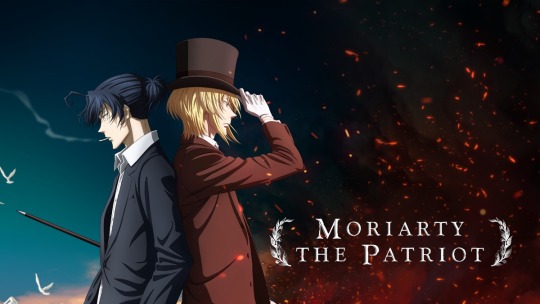
By: Peggy Sue Wood | @pswediting
It may surprise some of you to know that I have degrees in book reading and writing. While earning those degrees I studied one specific time period more than the others--that being British Literature from late-17th/18th century through the early 20th century. This is to say that it is a time period I know a little more about than you might think. And early 1900s is probably my favorite period out of that timeline, particularly England under Victoria’s rule.
And, perhaps, because of this strange obsession I have with the period, I presently have a small bone to pick over Moriarty the Patriot.
It’s not the minor inaccuracies of the clothes, nor the adaptation of character designs. It’s not even the adjustment to social tendencies depicted that are more Japanese than British-English of any period thus far either--because those kinds of things happen frequently in adaptations. And it's not Moriarty or his backstory too! Because, again, this is an adaptation, and liberties will be taken to fit the new story (besides, even in the original works by Doyle the man’s backstory was inconsistent).
My issue is with the character of Sherlock and his supposed “deductions.” Well, maybe more accurately it's with the writing of Sherlock.
You see, Sherlock is almost always introduced the same way in an adaptation. He makes a judgment about someone (usually about Watson or the Watson stand-in) and then proves it using his observational skills. This introduction is important because it clarifies that the world of the characters is one based on where common sense and science not only work but make sense. His deductions are logical and based on some semblance of rationality. Here is an excerpt from the original novel:
“I knew you came from Afghanistan. From long habit the train of thoughts ran so swiftly through my mind, that I arrived at the conclusion without being conscious of intermediate steps. There were such steps, however. The train of reasoning ran, `Here is a gentleman of a medical type, but with the air of a military man. Clearly an army doctor, then. He has just come from the tropics, for his face is dark, and that is not the natural tint of his skin, for his wrists are fair. He has undergone hardship and sickness, as his haggard face says clearly. His left arm has been injured. He holds it in a stiff and unnatural manner. Where in the tropics could an English army doctor have seen much hardship and got his arm wounded? Clearly in Afghanistan.'
How does this prove we are in a world where common sense and logic works? Well, because he didn’t pull any of these deductions from thin air. He just used his eyes and common knowledge to make a quick judgment.
In the example above, everything that Sherlock assumes is true and based on reasonable assumptions about the time period and about what he can observe of the person before him.
The tan of Watson’s skin is something he notes because London is usually dark and wet around this season, so you’re unlikely to get a tan. The way the man walks and stands is also a thing he can observe, and fresh military men walk very differently from the average citizen or gentleman. These two observations, coupled with noticeable injury and limp could lead one to think that maybe he has just come back from the current war (the First Anglo-Afghan War). Of course, maybe he wasn’t injured in the war at all--maybe something else happened; however, you can make a pretty good guess that an abled bodied soldier would not be home and looking for a room in the middle of war-times if something hadn’t happened to him on the battlefield.
My point is that all of Sherlock’s deductions come from observing details, paying attention to the basics of the world (such as the ongoing war or understanding rigor mortis), and using your senses. Sure, there may be a few things the average person doesn’t know that Sherlock does, but that’s because Sherlock has studied different things and to a more serious degree. The level of understanding is different, but not impossible to achieve in one’s own time or effort. And, as another note, Sherlock is not perfectly observant all of the time. There are plenty of examples of him needing to take breaks, of him closing his eyes to block out distractions so he can better focus on what someone is saying, and of him smoking to zone out for a bit so that he can come back to a problem with fresh eyes at a later time.
It’s absolutely vital to Sherlock’s character, and the original story, that all of the deductions are based on the “possible,” which is why the introduction of Sherlock in Episode 6 of this adaptation immediately irritated me. Here is the scene:
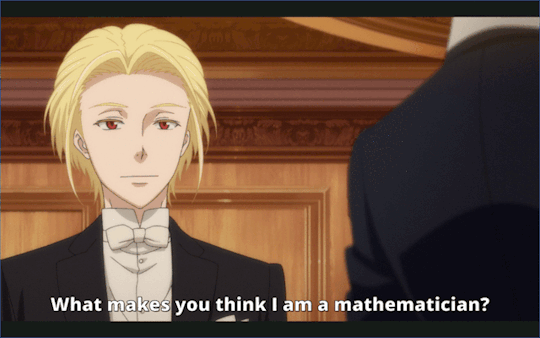
Side note: I’m sorry it’s shown as a poorly made gif--I literally could not find a copy of the clip with English subtitles on YouTube so I could not include it as a video. If you want to look at it in the episode itself, it starts at about the 13:00 minute mark. EPISODE LINK)
Here is what bothers me so much. Why would a mathematician be checking to see if the staircase on a ship fits the golden ratio? More importantly, why would that in any way matter to Moriarty as a character? Based on what we’ve seen so far of this character, and we’ve had 6 and 1/2 episodes to define him so far, none of Sherlock’s statement makes sense here.
Like, at all. (And I know that this also happens in the manga--doesn’t make sense there either.)
You know what would make sense though? For the time period and the character development we’ve seen of Moriarty thus far? A pause to consider-- and maybe even compare--staircases on the ship between the main steps for passengers and the steps for commoners or staff.
Why would that make sense? Oh, thank you so much for asking. Time to get real nerdy here for a minute:
Class issues were a serious problem in Victorian England (as they are now, though in a different way). These issues were not necessarily the same as depicted in the show but it was still consistently present throughout the society as a whole. (A good, short read on the subject can be found here for those of you interested: Social Life in Victorian England.)
One way that this issue came out was in the very architecture of homes. In Victorian England, nobleman homes and estates were built with main staircases, where the residents and guests walked, and servent staircases, where the staff and other temporary employees walked. The difference in these stairs was huge, as the servant staircases were basically death traps.
In the late 1800s, a mathematician (and architect) named Peter Nickolson figured out the exact measurements that would generally ensure a comfortable and easy walk upstairs:

BTW: Here is a great video on the subject and how they were death traps: Staircases in Victorian England
However, Nickolson’s math and designs were not used regularly in the design of houses for years to come.
By the setting of the story, and given Moriarty’s interest in maths, his understanding of class issues, and beyond--this kind of knowledge would make far more sense than searching for the golden ratio in a man-made set of stairs.
Moreover, the golden ratio is generally interesting to mathematicians (to my understanding) because it can be seen in nature frequently. It is a pattern found everywhere, from the way that petals grow on flowers, to how seashells form, to freaking hurricane formations! So why on Earth would Moriarty be interested in an architect's choice to use such a ration when planning a staircase?
He wouldn’t, I believe. Nor would Sherlock generally be able to make that assumption based on his time gazing at the staircase, distance from said staircase, nor angle.
So what can he deduce, if not that? Well, he may be able to deduce that Moriarty is a nobleman based on his attire. He may also be able to deduce that the man is a student based on age, as in an earlier episode we were told he’s quite young to be teaching in university and appears close in age to his students. Maybe he’s a student of architecture? But, if he’s a nobleman--as we suspect he is based on his attire--then it's unlikely he works a labor-intensive job or one close to it. So, he must be in academia for academic reasons such as mathematics. Physics during that time, as an academic subject, focused more on lighting, heat, electricity, magnetism, and such. And, Sherlock notes that Moriarty is specifically looking at the stairs, not the lights of the ship.
So, BAM! I’ve deduced Moriarty is a young nobleman who is likely a student of mathematics. Perhaps he’s recently had a lesson on staircases or another algebraic concept that’s caused him to pause with momentary interest.
It makes a heck of a lot more sense than finding a “golden ratio” in a man-planned and man-made staircase... don’t you think? And, maybe, we can even deduce that rather than a student he’s a professor who has just thought up an interesting lesson--though that would be a BIG jump from the data we’ve been provided here.
Deductions that come from major leaps in logic make it seem like Sherlock is doing magic... and he is--because it is magical that people find it impressive or believable. It’s not. And I would argue that the original character would find it insulting based on his comments to Watson regarding being compared to other fictional detectives.
Pay in mind, I have this feeling about several adaptations, so my judgment on Moriarty the Patriot isn’t technically exclusive. It just hit me so hard in my first viewing that I felt I needed to share because generally, this issue of deductions becoming magic rather than stemming from logic doesn’t happen in the first two minutes of meeting Sherlock Holmes.
So... yeah. Thanks for coming to my absurd history/lit lesson through Moriarty the Patriot. I appreciate you sticking with me to the end and hope it was enjoyable.
You can watch the series on Funimation.com right now at: https://www.funimation.com/shows/moriarty-the-patriot
Overall, it’s a pretty good series; although there was a lot more child-murder than I expected...
#Moriarty the Patriot#Yuukoku no Moriarty#funimation#analysis#character analysis#character#sherlock holmes#james moriarty
45 notes
·
View notes
Text
I Will Now Express Every Thought I Have About Pacific Rim: The Black
⚠️ spoilers for the whole thing baby
I actually forgot Pacific Rim: The Black was premiering today until I saw it in an article this morning! When I first heard about it months ago, I was decidedly not sold on a Pacific Rim anime. Uprising burnt me the fuck out and I don’t have a lot of trust left in me for new entries to the franchise. But I had heard rumblings of Raleigh and Herc being referenced after going into #pacificrim and I decided I may as well check out to see what was up! I binged it in 4 hours and it sure was a whirlwind, I’ll tell ya
The Plot
I really enjoy the setting and initial concept! We’re so use to seeing Kaiju/Jaegar shenanigans play out within these major cities with helpless civilians everywhere that spending so much time in a lonesome desert and these destroyed civilizations was really cool and indicative of the changes Pacific Rim has undergone in the last few years. I also looooved the Desert Settlement from the beginning!! It seemed really homey and picturesque; I wish we’d spent more time with the other survivors and got to see more of their day to day aside from farming and sitting.
I also found the first episode set up to be really tight and well written! I was hooked during the initial flashback, Hayley and Taylor’s fight was really poignant and well acted, and the reveal of Atlas Destroyer felt really huge and epic!!
But once we left the Desert Settlement and the plot started actually moving along, the pacing becomes suuuper rough. We spent way too long in Bogan with Shane and Mei; there’s only 7 episodes and we spent, like, 3? 4? within the confines of that camp and I felt it weighed the plot down. Boy is introduced in the 2nd episode and, because the narrative spends so much time on Shane’s evil machinations and Mei’s back story, we still don’t know anything concrete about his origins or purpose 3 episodes later! That felt frustrating to me
The story beats overall were very predictable. I was able to pick up on Mei’s backstory via her dynamic with Shane in their introductions, so her memories felt too built up and too hollow once they were revealed. The same with the reveal of Boy’s Kaiju form; he was in a big green test tube in a PPDC base - I assumed immediately he was a part-kaiju experiment and again his reveal felt hollow, especially after the glacial pace of it’s development.
Even when events weren’t predictable, they lacked weight. The appearance of several Kaiju Breaches in “Boneyard” felt very cheap for some reason; I wasn’t scared and I didn’t feel tense about these odds mounting against the protagonists. This was just happening and I was just watching.
The Art Direction and Animation
I’m very obsessed with all the new Kaiju we got from this; I love how Copperhead is rendered, they’re a joy to see on screen!! The Rippers are also very cute and deserve little plushies...i love these neat little dogs. Boy’s Kaiju Form is very intimidating with an interesting color palette and I loved seeing him next to Copperhead’s highly saturated design!
That’s unfortunately all that I liked however; All the human character design is unmemorable to me. Every character looks exactly like another easily identifiable anime character from a different property (Hayley looks exactly like Zero Suit Samus to me, for example. And Mei kept reminding me of both Bernadetta Fire Emblem and Motoko Kusanagi from GitS. The list goes on).
I can sort of understand why they’re so bland? A franchise going from Live Action to something as heavily stylized as anime is probably a really difficult transition and these designs are probably meant to be more lowkey than more unique anime designs in order to help that transition. But realistically stylized designs can still be recognizable and unique! These feel uninspired and bare bones.
I have no problem with the switch to CGI animation that modern anime is doing because I know it’s a lot cheaper to produce and it can still be really unique and striking! But The Black’s model animation felt very stilted and inconsistent. I don’t have a lot of knowledge about animating so I don’t think I can accurately describe what I disliked? Wooden is probably the best term. Character movements felt wooden and things like hair and clothes felt plastic.
Impacts also had very little weight. The fight between Tayler/Mei and Copperhead reminded me of when you’re in a dream and trying to punch something, but you can’t punch hard. It was simply too floaty and too soft. The final showdown in “Showdown” was better, but not by much. It was very immersion breaking seeing these Giant Robots and Giant Monsters unable to throw a real solid hit!
Characters
My favorite character was unequivocally Joel Wyrick. We love Joel Wyrick in this house! Joel’s character has real charisma and charm. I love his flirtations with Loa, how his cocky disposition is juxtaposed with his drinking problem and later insecurities over his lost memories, and his genuine kindness shown to Mei, Taylor, and Boy. No one ever plays with Boy, they just run after him and drag him around...but Joel has this moment in “Escape from Bogan” where he kneels down to Boy and helps him collect rocks. It was sweet!
So of course, when Joel dies for absolutely no reason 5 minutes later - pissed! I was pissed! I yelled “COME ON” aloud in my studio apartment! I was genuinely so excited to see him interact more with the rest of cast then, poof. No More Joel.
His death felt like it was for shock value to me rather than actual narrative development. Why kill him when we still don’t fully understand his and Mei’s relationship? Why were they so close? Were they childhood friends, or just coworkers that happen to become friends? Why did he specifically know all the details of Shane’s abuse towards Mei before she did?
What did his death accomplish? It made Mei sad...ok? She was already...very sad. Her running away from Shane already had consequences - the consequences of Shane coming after them for revenge in the future. Why did Joel have to become a causality?
His death is ultimately tied to Mei’s character arc which is, unfortunately, my least favorite :c I find Mei to be a really one dimensional character with a personality, backstory, outlook, and motivation that I’ve seen done a million times before with a million other characters. She feels very out of place in the franchise as a whole - Pacific Rim is, at it’s core, a story about connecting with others. Her self-centric arc and lack of desire to connect outside of drifting really alienates her from the story at large and it frustrates me how long The Black’s narrative spends on her.
Hayley and Taylor were otherwise very interesting in the pilot episode, but become similarly one dimensional at the story chugs on. Taylor’s unflinching (bordering on unhealthy) faith in their parents was really interesting next to Hayley’s complete acceptance of their parents’ death. But once the two of them make up their differences, they lack an interesting dynamic and become very passive protagonists.
Taylor especially has no personality - how would you describe Taylor? He’s...brave. He’s the older brother. He’s a leader? He’s nice? There is nothing noteworthy about him at all, which is sad considering I think he has the potential to be a really interesting way to explore the original movie’s influence on The Black’s story.
Hayley’s grief and self-blame are more interesting than Taylor’s...nothingness, but she still falls into this one-note trope of being the naive, excitable little sister. I guess I feel abnormally frustrated about this flat character writing because Pacific Rim’s incredibly unique cast has always been an inspiration to me! It feels sad that this new iteration into the series is full of what feel like stock characters.
Then we get to Boy. How come Boy can’t have a person name? It’s specifically written in a dialogue between Taylor and Hayley: “I’m not going to call him Chad or Barnaby or one of those names for a baby brother you wanted as a kid,”
Why?
He’s by all accounts a human child when they find him. Yes, he was found in a big green test tube - but he walks and acts just like a human child. The only difference, seemingly, is that he is non-verbal and engages in strange/annoying behavior (running off, eating bugs, etc). So he isn’t deserving of a name?? I don’t know why that makes me so mad, it just does. it’s like they refuse to treat him as a human even before they find out he’s a Kaiju - it’s super weird! How can the story sell me on the three of them becoming found family (like they’re seemingly trying to do) if the protagonists won’t even treat this kid like a kid??
Misc. Thoughts
The callbacks to Stacker, Herc, and Raleigh were cool! I also like that Herc is a major plot point! We love Herc Hanson and it’s what he deserves. I also find Loa’s connection to Horizon Bravo very interesting...and the fact we’re getting Kaiju cultist lore! Love that! Love that!
Fucked up that the only two dark skinned characters were: 1) removed from the story 10 minutes in with no call back yet, 2) Killed after having 1 line of dialogue and fridged for the character development of the blonde white girl. I really need to know what the deal with those 4 characters leaving in the beginning was about - I absolutely thought we’d see them again by now, but no dice
I don’t know how to feel about Ajax and have no clue what their purpose in the story is. They’re cool, but whats the point?
If Mei and Taylor are paired up together romantically, I’m putting Craig Kyle and Greg Johnson in the time out box. Very tired of seeing random hetero romance B plots in stories that can’t even get their A plots together
Overall, it’s kind of subpar! It has the foundations of a really interesting story, but the pacing and characters really took me out of it. I’m interested in Season 2! I know season 2 is already ordered and I’d love to see how things continue to develop, see if the character writing gets any better - but I’m not too hopeful unfortunately. I really really love Pacific Rim after all these years and I’m happy to still be getting content and world building! There’s just sooo much I would change about this however. At least fanfiction’s free!
Thanks for reading all this, I have ADHD and just go on and on if u let me. hmu if You Too have thoughts about Pacific Rim: The Black and have no one to talk abt them with
#pacific rim#pacific rim: the black#pacific rim the black#taylor travis#hayley travis#long post#sorry this is thousands of words. i contain multitudes
51 notes
·
View notes
Text
REALLY LONG CHARACTER SURVEY.
RULES.
repost , don’t reblog ! tag 10 ! good luck !
TAGGED. I took this from Minnie’s archived Bioshock blog. I’ve been looking for this meme all this month.
TAGGING. @hammurabicomplex. @bluuxriising. @ Me - for Sal on @bulletsoverbensonhurst. @immaterialed (charlie) @soypeor (bella) @svmmercmance. @mrflayed. and you!

BASICS.
FULL NAME : Eve Delores Littlejohn
NICKNAME : Evie, Little Evie (by her maternal side of the family), Delores, Didi
NAME MEANING / S
Eve is from the ancient Hebrew name חַוָּה (Chawwah), which was derived from the Hebrew word חָוָה (chawah) meaning "to breathe" or the related word חָיָה (chayah) meaning "to live".
Delores is a variant of Dolores, meaning "sorrows", taken from the Spanish title of the Virgin Mary María de los Dolores, meaning "Mary of Sorrows."
Littlejohn is a surname that has historically been found in England and Scotland. With potential origins being either ‘to distinguish a beloved child that was not the eldest.’ Or, ‘a contradictory nickname for a large man.’
HISTORICAL CONNECTION? : She’s named after her grandmother, Evelyn Hollins.
AGE : 42
BIRTHDAY : June 2
ETHNIC GROUP : Black-American. Meaning she’s mixed with a lot (Some of her relatives are respectively Creole and Italian) but uses Black as a catch-all term.
NATIONALITY : American
LANGUAGE / S : English, Italian, Spanish, Latin, some French
SEXUAL ORIENTATION : Bisexual
ROMANTIC ORIENTATION : Biromantic
RELATIONSHIP STATUS : Verse dependent, usually married -or connected- to Salvatore Scozzari in some way.
CLASS : Upper-Class
HOME TOWN / AREA : Brooklyn. Spent time between Bedford-Stuyvesant - with her paternal grandfather and Park Slope - with her maternal grandparents.
CURRENT HOME : In her childhood home in Bedford-Stuyvesant.
PROFESSION : Ballet Instructor. Former Professional Ballerina. ( Other verses see her as a professional thief. )
PHYSICAL.
HAIR : Black. In terms of her natural hair, Eve has springy, 3C hair she seldom shows off because she was raised in a family where straightened hair was deemed presentable and professional.
EYES : Thin almond eyes. Dark brown.
NOSE : Straight and small.
FACE : She has a prominent, high forehead, that’s accented with high cheekbones and a pointy chin.
LIPS : Full.
COMPLEXION : She has a light brown (tawny) complexion.
SCARS : None major.
TATTOOS : None.
HEIGHT : 5′4″
BUILD : Eve has a slender build. One of those people who have been small and petite since childhood. Despite this, she also stays skinny because she is obsessively conscious of the food she consumes. The older she gets the more she weighs, however.
USUAL HAIR STYLE : Her hair is cut short. Reaching her shoulders in a neat, even bob. She either curls it in a retro fashion or curls the tips. For work she wears it in a traditional, pinned bun.
USUAL FACE LOOK : In public, she appears stoic for the most part. Any emotion shown (such as the length of a smile) is carefully calculated. She has to seem perfect.
USUAL CLOTHING : Form fitting dresses. Incredibly chic and fashionable for the time. Shoes include heels - never open-toed, unless she has on stockings. Extravagant earrings. Jewelry that can include either necklaces, crosses, pearls, or dainty rings. Prone to wearing black sunglasses in public.
PSYCHOLOGY.
FEAR / S : Thunderstorms, airplanes, creatures like weasels, snakes and ferrets, break-ins, men she doesn’t know, harm coming to her children
ASPIRATION / S : Formerly wanted to become a major [black] ballerina in the elite world of ballet, now she just wants to expose more [inner city children] to dance through her job. Personally, she wants her children to change the world in some form or fashion, too. Eve also has good ideas on improving the community, but at the moment has no idea how to go about these ideas.
POSITIVE TRAITS : Generous, compassionate, patient, protective
NEGATIVE TRAITS : Strict, sullen, hard to read, represses her emotions, secretive
MBTI : Advocate - INFJ-T
ZODIAC : Cancer
TEMPERAMENT : Melancholic
ANIMALS : Lioness
VICE / S : Pride & Lust
FAITH : Christian. Grew up Baptist, but Catholic influences have been around her since childhood. Attended a Catholic High School in Park Slope, her grandmother Evelyn was also a practicing Catholic.
GHOSTS ? : Yes and no. She feels that objects formerly owned by the deceased posses the essence of their previous owners and that they essentially live on through these pieces of property.
AFTERLIFE ? : Yes.
REINCARNATION ? : No, but it’s a romantic concept.
ALIENS ? : No.
POLITICAL ALIGNMENT : Democratic
ECONOMIC PREFERENCE : She likes being where she’s at now. But honestly, being upper class is all she’s ever known.
SOCIOPOLITICAL POSITION : Bourgeoisie, basically. The Littlejohn’s represent The Historical Black Elite.
EDUCATION LEVEL : College level.
FAMILY.
FATHER : William ‘Bill’ Littlejohn
MOTHER : Linda Littlejohn ( nee Hollins )
SIBLINGS : None
EXTENDED FAMILY : Amos Littlejohn (paternal grandfather) Liza Littlejohn (paternal grandmother) Evelyn Hollins (maternal grandmother) Giuseppe D’Aietti (maternal grandfather) and a wide host of cousins, aunts and uncles.
FAVOURITES.
BOOK : Night Song by Beverly Jenkins. The Color Purple by Alice Walker. Some sort of old, French erotic novel that was published before she was born.
MOVIE : Eve watches films along the lines of...Waiting to Exhale, Beaches, The First Wives Club and Fatal Attraction. She loves Made-For-TV movies from the time period. In regards to plays, her favorite one is Sunday In The Park With George.
5 SONGS : Meet Me On The Moon / Essence of Sapphire / No One In The World / People / The First Time I Saw Your Face
DEITY : Persephone
HOLIDAY : New Years Eve, Christmas, Thanksgiving. Major holidays during the colder season.
MONTH : October
SEASON : Autumn
PLACE : The dance studio she works at.
WEATHER : Sunny, but cool.
SOUND : The voices of Anita Baker and Sarah Vaughn. A skilled hand running over piano keys. Soft trumpets. Running water. Cats making chipper little meows.
SCENT / S : Perfume, floral scented lotions, her partner’s cologne
TASTE / S : Caramel, the tang of dark chocolate, strawberries coated with either chocolate, or sprinkles of white sugar. Light Vinegar.
FEEL / S : Performing in front of an audience. Hot water engulfing your skin after a long day. Satin - whether it be the fabric of her clothes or sheets, your fingers tightly intertwined with another’s, feeling your significant other’s chest raise and lower against your skin with each breath they take.
ANIMAL / S : Cocker Spaniels, Afghan Hounds, Cats, Birds - she loves all ( well, a majority ) of animals.
NUMBER : Doesn’t have one.
COLOR : White, Pink, Gold.
EXTRA.
TALENTS : Dance, Eve is trained in ballet when it comes to her main verse. She has attended ballet classes since the age of eight and ever since then she placed all of her focus into it. Similarly, Eve has always had the makings of a good artist - as a child she enjoyed drawing and had informal art lessons with a man who lived in the basement of her grandfather’s brownstone, but she never invested into that half of her.
BAD AT : Singing, Being interviewed, Public Speaking (as in Speech Giving), Decision Making
TURN ONS : Charisma, Leadership Skills, Temperature Play, Phone Sex, Heavy Kissing, Light Roleplay
TURN OFFS : Public Sex, Tearing [ Her ] Clothes, Threesomes, Cruelty, Senseless Violence
HOBBIES : viewing plays & some musicals, reading romance novels, shopping, working out (she was into the whole celebrity VHS tape exercise trend), playing tennis, decorating
AESTHETIC : Vintage Black Glamour, Black Ballerinas, Champagne and Wine Glasses, Paintings by Melinda Byers and Edward 'Clay' Wright
QUOTES : "I'm bad with words, I hope you're good in reading eyes." / "There are truths I haven't even told God. And not even myself. I am a secret under the lock of seven keys."
FC INFO.
MAIN FC / S : Lynn Whitfield ( A Thin Line Between Love & Hate )
ALT FC / S : Kylie Bunbury ( Twisted )
OLDER FC / S : Lynn Whitfield ( Greenleaf )
YOUNGER FC / S : N/A
VOICE CLAIM / S : Lynn Whitfield
MUN QUESTIONS.
Q1 : if you could write your character your way in their own movie , what would it be called , what style would it be filmed in , and what would it be about ?
A1 : Recently I decided that if/when I try to write anything serious about Eve again, it’ll center on her being a jewel thief because it presents me more fun, and emotionally diverse, opportunities. That and I have a very specific cover image in my mind. Ideally, her adventures would be a series of books. I have no title in mind, no idea about how ‘it would be filmed’ ( although a style replicating 90s films would be excellent, film grain and all. ) but, I do have a bunch of plots in mind that I really don’t feel like typing out here.
Q2 : what would their soundtrack / score sound like ?
A2 : Her score would have a vintage sound (or a jazzy Spike Lee sound, if you will) with instrumentals by Dorothy Ashby (a Jazz Harpist) the Ahmad Jamal Trio, Pharaoh Sanders, Yusef Lateef and Tarika Blue. For music with lyrics, the soundtrack would include the likes of Julie London, Sarah Vaughn, Ella Fitzgerald, and Dionne Warwick.
Q3 : why did you start writing this character ? + Q4 : what first attracted you to this character ?
A3 : Whenever I make NPCs for my character’s lives I actually can’t just let them just be NPCs. I start thinking about them too much. Developing them too much. And then I’m like, ‘wow! I really like this character!’ Eve was a different character when I began writing her, and likely wouldn’t be considered the same character as she was previously, if I told someone in real life who knows about my writing (like my grandma) about all the changes she has undergone.
Originally Delores was a university professor, because I thought it could lead to interesting interactions with college-age muses. And her previous history with the mafia was also something interesting to tap in. But then I started thinking about what was realistic, what wasn’t realistic, what did I feel comfortable/interested writing? What didn’t I feel comfortable/interested in writing?
So as time went on, things would alter about this character. And the new things I came up with attracted me more.
Q5 : describe the biggest thing you dislike about your muse.
A5 : I have a love/hate relationship with Eve’s quiet demeanor. On one hand, I think quieter characters need love and the ability to be fully dimensional but on the other hand, writing louder characters has always been more fun for me. But really, Eve’s guarded behavior makes writing her stressful in some cases with others because sometimes...if I’m going to be honest...people don’t know how to carry a thread and interact with someone of her demeanor effectively.
Q6 : what do you have in common with your muse ?
A6 : We’re both black, we’re both into art (although our exact interests and aesthetics with art differ)
Q7 : how does your muse feel about you ?
A7 : Realistically she would think I need to take better care of myself.
Q8 : what characters does your muse have interesting interactions with ? A8 : We skippin’ this question.
Q9 : what gives you inspiration to write your muse ?
A9 : Films such as, “Waiting to Exhale,” “The Kitchen” and “Widows.” Books by Alice Walker, like “The Third Life of Grange Copeland” as well as her short story, “Roselily.” The historical mob figure Stephanie St. Clair.
Q10 : how long did this take you to complete ?
A10 : A few hours.
8 notes
·
View notes
Note
Can I just ??? I've been binge-reading your series for weeks and the way you handle your OCs' character development (Magnolia and Sirrus, primarily) is so satisfyingly paced. The fact that you reveal little by painstaking little across many chapters feels not only organic but leaves a lot to cover down the course of the story so there's always something new that surprises me and lets me chew on! (1/2)
I would like to start this by saying that I have seen this message multiple times in the months that it's been in my inbox and I AM SP SORRY I TOOK SP LONG TO RESPOND! Thank you for your kind words! I'm so happy that you enjoy them! Part of the reason that they might be interesting to you is because they are OCs in my DMC AU, but both of them (Especially Sirrus) originate in some form from a story that I've been trying to talk myself into writing since High School. I started it in 10th grade and used to write it little by little every day between and during classes, and then one day I just stoped.
It's undergone many revisions and rewrites since then (I even wrote a paragraph by paragraph outline of the entire story as it stood in 10th grade that I can give you the link to if you'd like) and Sirrus is one of the most recent editions to that story. I created him back in 2018 as a result of me reshuffling aspects of that story to see what I wanted to keep for a possible rewrite, and Magnolia is much the same but she came a year later when I started thinking up the post DMC5 AU. As a result I fleshed both of them put before I even fleshed out the story as you now know it, so that might be why they are at least a little bit ago interesting! I'm thrilled that you like them as much as you do!
Pacing is one of the most important aspects of a story for me, so as much as I want to take the short way out at times, I rarely do. It's just so much less satisfying to read and to write, as far as I am concerned. So I'm glad that you like the pacing of the character development and hopefully the story over all!
Thank you so much for taking the time out of your schedule to leave me this wonderful comment! So sorry that I took so long to respond to you! I'll do much better in the future. Thanks so much for checking out my story! Your awesome and I love hearing from you!
... It's so nice to get a good ask for a change. They are overwhelmingly negative the majority of the time. Well, at least they were before I turned off Anon. It's been fine for the most part since then!
Thanks again! I hope to hear from you again in the future! I'm always happy to answer questions or just talk about the story! I love engagement with the people who read my work. Your the reason I write, after all!
Take care! Bye bye 💕! And sorry for any spelling mistakes! Cellphone!
#since you asked#answered asks#devil may cry#My post Devil May Cry 5 AU#my thoughts#devil may cry v#my asks#ask me anything
2 notes
·
View notes
Photo
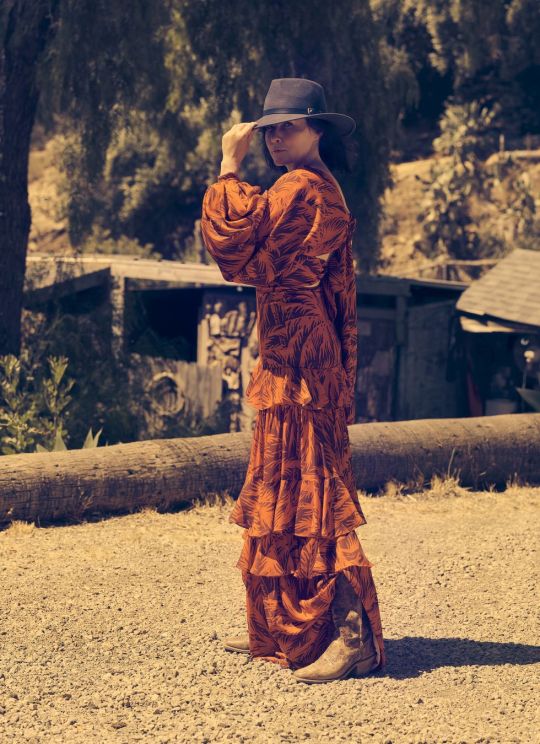
Shannen Doherty Is Not Signing Off Just Yet
Fighting Stage IV breast cancer has forced some self-reflection, but the ’90s icon and so-called diva refuses to slow down.
By Kate Pickert Sep 29, 2020. Photos by Kurt Iswarienko. Elle USA October 2020 issue
On a cool evening in February 2019, Shannen Doherty invited some friends to a Venice, California, rental house for a dinner party. Doherty’s actual home was in Malibu, 20 miles north, but she and her husband, photographer Kurt Iswarienko, had fled the property a few months earlier, when a wildfire that started inland burned nearly 100,000 acres on its way to the Pacific Ocean. The couple’s house survived the blaze, but Doherty says the property sustained significant damage that made it uninhabitable.
The guest list for the dinner included only people Doherty trusted: her husband and the friends who knew the real Shannen—not the 1990s tabloid caricature, the loudmouthed bad girl with a temper. Actress Sarah Michelle Gellar was there, along with model Anne Marie Kortright, Malibu real estate agent Chris Cortazzo, and a Los Angeles doctor named Lawrence Piro.
Doherty had compiled the guest list, but it was Piro, her oncologist, who drove the conversation. Less than two years earlier, the actress had finished treatment for breast cancer, and Piro was at the dinner to explain that Doherty’s disease was back. The cancer, Piro said, was now metastatic (also known as Stage IV), meaning it had spread beyond Doherty’s breast and lymph nodes. “The way he presented everything to everyone was matter-of-fact,” Doherty, 49, tells me when we speak in June. The news was devastating, of course, and Doherty had invited Piro so her friends could get answers to the questions she knew they would have. Would she die of this? Probably. Would she die soon? Probably not. Why did this happen? It was impossible to know. Could this be treated? Yes, to a point. “Everybody got to ask questions and know what we were looking at as a group, as a team,” Doherty says.
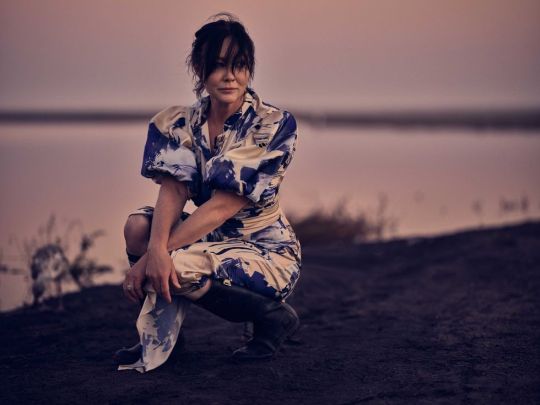
About 300,000 American women are diagnosed with breast cancer every year. In the majority of cases, initial treatment for the disease is effective, curing the patient. But in a significant share of cases, the breast cancer returns, either to the breast or nearby lymph nodes or to other parts of the body. In Doherty’s case, despite the surgery, chemotherapy, and radiation she had undergone after her first diagnosis, it seemed that some cancer cells had survived the assault and made their way to her spine. Eventually, the disease will most likely spread further, to Doherty’s brain, lungs, liver, or some combination thereof.
Still, there was reason for hope, Piro told the group. Treatment for metastatic breast cancer, which was once an automatic death sentence, has advanced in recent years, with patients living longer and having a better quality of life. Some survive for a decade or more. Doherty’s treatment would include hormone therapy to block the estrogen fueling her cancer, plus a second targeted drug that is often effective at stabilizing metastatic disease. If this didn’t work, there were other drug combinations to try, but the bottom line was that Doherty would be in treatment for the rest of her life. As Piro explained all this, his patient sat at the table, listening.
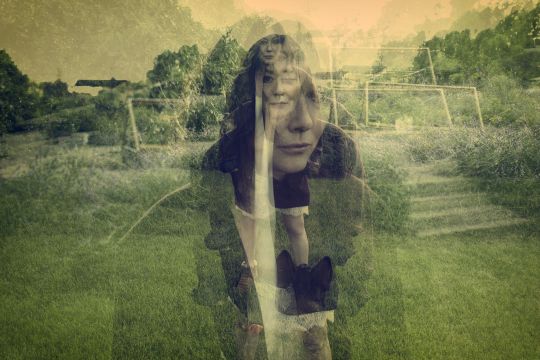
Nearly 30 years after she played Brenda Walsh on Beverly Hills, 90210, Doherty is still striking, with high cheekbones and shiny, jet-black hair. “I think people have a mental picture of Stage IV cancer as someone sitting in a gray hospital gown, looking out a window on their deathbed,” Iswarienko, tells me. “I don’t see a cancer patient when I look at Shannen. I see the same woman I fell in love with. She looks healthy and vital.”
As if a massive wildfire and a metastatic cancer diagnosis weren’t enough, there was more bad news to come. Weeks after the Venice dinner, Doherty’s 90210 costar Luke Perry died suddenly of a massive stroke. After the show, they had grown apart, but they’d reconnected in recent years. They were even talking about working together, developing a new television project.
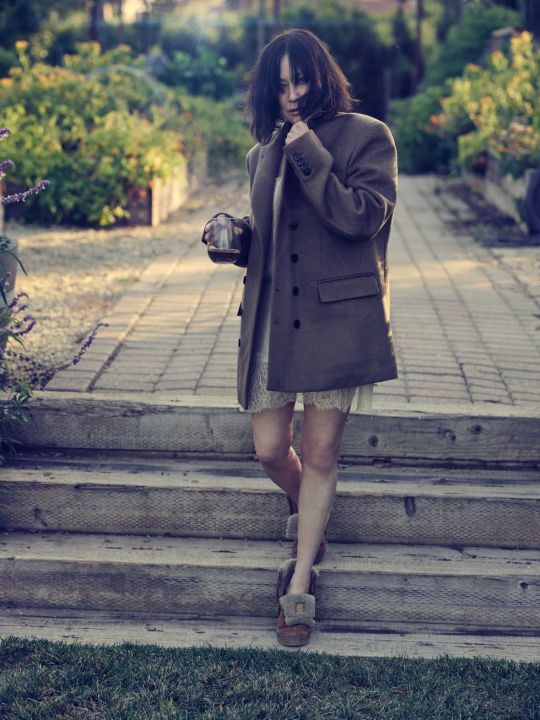
At a memorial service for Perry in March 2019, Doherty saw Brian Austin Green, the only other 90210 castmate she could call a close friend. Green had known Doherty even before they were onscreen together, and she shared the news of her metastatic diagnosis with him, even though she was keeping it under wraps publicly. Doherty and Green chatted at the memorial, and the conversation eventually shifted to the latest reboot of the show, called BH90210, a scripted-reality version of the old nighttime drama set in the present day. Castmates Tori Spelling and Jennie Garth had helped come up with the idea for the series, which had been green-lighted at Fox, and all the principals of the original had signed on—except Doherty.
Even before her cancer diagnosis, Doherty was dead set against doing the show. “I had already done two 90210s by that point,” she says. “I didn’t really see it as something that was going to help, but I did feel that it could stir up stuff from when I was 19 years old.”
The 1990s made Doherty a household name, but the decade also left scars. She had helped build 90210 and the Fox network into juggernauts, but on and off set, she seemed to run into problems wherever she went. Celebrity tabloids regularly published stories about Doherty fighting with producers, writers, and actors. She was a diva, according to reports. She was a bitch, they said, impossible to deal with. A 1993 People magazine cover declared Doherty “Out of Control!” after the actress’s ex-fiancé accused her in court of threatening him with bodily harm. The story itself, one of many like it, reported that Doherty had “left a trail of bad debts, trashed homes, exhausted friendships, and wasted relationships.” There was even an I Hate Brenda newsletter devoted to bad-mouthing Doherty and her onscreen character. “The more stories that were written about me, the more defensive and closed off I became,” Doherty tells me. “And the bigger the walls I built around me. I had a lot of resentment.”
Doherty had worked hard to move on from that time. When the newest reboot came around, she had long been out of the spotlight, but her relative obscurity had an upside—privacy, which she prized more than anything. She didn’t want to go back, to the tabloids or her castmates. But Green asked her to reconsider. “I was really pitching her: ‘I know it’s going to be fucking hard, but come do it. I think it’ll be really good for you,’ ” Green says. The actors had grown up and were all different people now, Green told her, and so was she. He would act as a buffer if she needed one. “ ‘This is a rare opportunity to experience each other again in a much different way,’ ” Green says he told her.
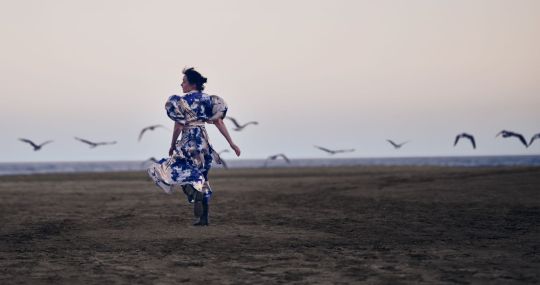
Perry’s death shifted things for Doherty. Maybe the show could be a sort of tribute to him. Maybe it was a chance to prove to herself that metastatic breast cancer didn’t mean the end of working. Maybe it was both. “Things happen and you go, ‘All right, this is what I’m supposed to be doing at this moment,’ ” she says.
This moment would be different. Doherty had changed, yes, but so had her ability to fight back against negative stories in the celebrity press. “I knew that once I signed up for the show, the bullshit would start all over again. And, in fact, it did,” she says. The reboot’s showrunner and several writers quit before the new show began shooting, and rumors swirled that Doherty was once again acting out. “I addressed it immediately,” Doherty says. On Instagram, she wrote, “I refuse to be cast in the same villain role because ‘journalists’ lack imagination.… I am a woman with my own story.” She wrote that the rumors about her causing upheaval with the new show were untrue and that she was a more complicated person than the headlines made her seem: “I promise,” she wrote, “you don’t know me.”
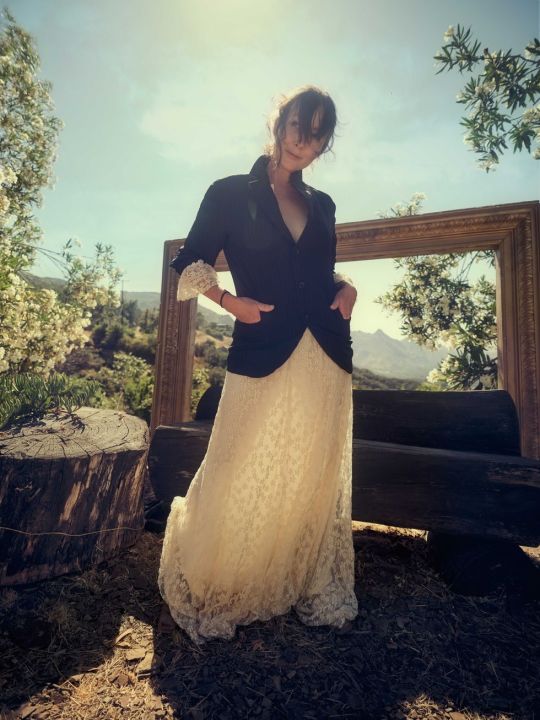
Part 1 - Part 2
#Shannen Doherty#2020#2020s#2020 photoshoot#Elle magazine#inteview#article#2020 article#2020 magazine#2020 Elle magazine#Kurt Iswarienko#Anne Marie Kortright#Luke Perry#Brian Austin Green#1990s#acting career#Beverly Hills 90210#1990s beverly hills 90210#2019 BH90210#2020 interview#health#breast cancer#stage 4 breast cancer#Sarah Michelle Gellar#2020s photoshots#2020s magazine#2020s article#2020s interview#quotes#2020 quotes
12 notes
·
View notes
Text
GRRM's Original Outline "What has changed?"
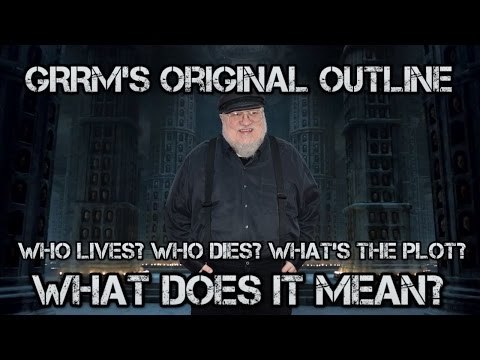
Hello,
Now you all know Martin's letter he wrote in '93. When this letter was written and sent to the editor, the first 13 chapters (200 pages) were already written. In addition, the book consisted of three volumes of the first stage, but as you know, but its 7 volumes now.When we read the letter and the first 5 books, the first comment made was very different and different from the first outline; one or two things remain the same. But is it really? Here I would like to discuss this with you. I think I will go through the events step by step and you will make your own contributions when you read. Let's start!
1. Stark-Lannister war. It's remain, nothing changed.
2. (Dany) Targaryen's 7K invasion with Dothraks. It's still did not happend but we know Dany has Unsullied and some sellswords and next book, she will have Dothraks too. She will linger a little more in essos and then come to the West for the conquer. It's remain too.
3. The Others. GRRM said " Their story will be [sic] heart of my third volume, The Winds of Winter. " It's remain too.
4. Five Main Key Characters (Jon, Arya, Bran, Dany and Tyrion). " In a sense, my trilogy is almost a generational saga, telling the life stories of these five characters, three men and two women. The five key players are Tyrion Lannister, Daenerys Targaryen, and three of the children of Winterfell, Arya, Bran, and the bastard Jon Snow." It's remain too.
5. Fall of the Starks. " Things will get a lot worse for the poor Starks before they get better, I'm afraid. " Yes, indeed it happened.
6. Dead of Robert and long may live new king! "Ned will discover what happened to his friend Jon Arryn... will have an unfortunate accident, and the throne will to brutal Joffrey, still a minor." Yes, it happened too. This substance remained the same too.
7.Sansa and Joffrey. "Sansa Stark wed to Joffrey Baratheon, will bear him a son, the heir to the throne, and when the crunch comes she will choose her husband and child over her parents and siblings, a choice she will later bitterly rue. " Sansa betrays his family anyway but she did not wed Joffrey or bear his son. This substance has changed a bit.
8. Bran's coma and dream and greenseer and dead of Robb. " Young Bran will come out of his coma, after a strange prophetic dream... He will turn to magic, at first in the hope of restoring his legs, but later for its own sake... Robb Stark will die in battle."
Bran's the same, but Robb's got some change. Robb doesn't die in a war against Joffrey, Jaime and Tyrion. But he really wins a few battles at first (against Tywin. So there's no Tywin in the first place) and then he dies at the Red Wedding.
Bran's in a coma. So Jaime and Cersei are standing exactly. This shows that Jon Arryn's death is due to his learning of the relationship(Jaime-Cersei). So Joff was a bastard in the first outline too. Ned died for the same reason.
Tyrion did not burn Winterfell but fought against Stark army and became Hand of King. Jaime fought against Robb too and lost, was captured. This part is different in some ways, but the same in some ways.
9. Jon Snow, The Wall and Lord Commander. " Jon Snow, the bastard, will remain in the far north. He will mature into a ranger of great daring, and ultimately will succeed his uncle as the commander of the Night's Watch "
Jon goes the wall and will became lord commander but Benjen was lord commander in the first place but it seems he dies anyway or disappear. It's remain.
10. Helping family and Jonarya Love. " When Winterfell burns, Catelyn Stark will be forced to flee north with her son Bran and her daughter Arya. Wounded by Lannister riders, they will seek refuge at the Wall, but the men of the Night's Watch give up their families when they take the black, and Jon and Benjen will not be able to help, to Jon's anguish. It will lead to a bitter estrangement between Jon and Bran. Arya will be more forgiving ... until she realizes, with terror, that she has fallen in love with Jon, who is not only her half-brother but a man of the Night's Watch, sworn to celibacy. Their passion will continue to torment Jon and Arya throughout the trilogy, until the secret of Jon's true parentage is finally revealed in the last book. "
Winterfell is being burned by Greyjoys. Cat is not with Stark children, he is with Robb. Bran and others run away and went to the Wall. But Bran and others did not take refuge in the black brothers. Jon has something to do with Arya again. He wants to protect and save her(FArya). He can't do it because of his vows and he's in a lot of pain... And we know who is Jon's real parents.
Jon and Arya love... It's still too early to say anything about it. When Arya goes to the wall, the love between the two emerges. Arya escaped from KL as in the first outline. But instead of going home, she drifted into her own adventure. Arya has been trying to get home and Jon all along. She'll probably go straight to the wall when she gets back from Braavos. There are so many hints about Jonarya love in books. ( https://asoiaf.westeros.org/index.php?/topic/125364-jon-arya-hints-and-overall-significance-of-their-relationship-including-part-3/ )
11. Beyond The Wall and Bran-Cat-Arya. "Abandoned by the Night's Watch, Catelyn and her children will find their only hope of safety lies even further north, beyond the Wall, where they fall into the hands of Mance Rayder, the King-beyond-the-Wall, and get a dreadful glimpse of the inhuman others as they attack the wilding encampment. Bran's magic, Arya's sword Needle, and the savagery of their direwolves will help them survive, but their mother Catelyn will die at the hands of the others." This part has undergone significant changes. Despite this, some small parts remained.
Arya is not with them, Cat neither but she dies anyway (and came back but as fire wight not ice wight). Bran never meet Mance(yes, Mance exists) and see others but he sees deads and met Cold Hand(ice wight) and BR and Singers. I guess Rickon is not exists.
Arya has Needle, that's mean Jon gave her it anyway. And direwolves...
12. Dany, Viserys and Drogo. “Over across the narrow sea, Daenerys Targaryen will discover that her new husband, the Dothraki Khal Drogo, has little interest in invading the Seven Kingdoms, much to her brother's frustration. When Viserys presses his claims past the point of tact or wisdom, Khal Drogo will finally grow annoyed and kill him out of hand, eliminating the Targaryen pretender and leaving Daenerys as the last of her line. Danerys [sic] will bide her time, but she will not forget. When the moment is right, she will kill her husband to avenge her brother, and then flee with a trusted friend into the wilderness beyond Vaes Dothrak. " Only 5% of this part has changed.
13. Dragon Eggs and Invasion Plans."There, hunted by [unclear] of her life, she stumbles on a [something about dragon eggs] a young dragon will give Daenerys [unclear] bend [unclear] to her will. Then she begins to plan for her invasion of the Seven Kingdoms." This part has changed 95%.
14. Tyrion's Fate. "Tyrion Lannister will continue to travel, to plot, and to play the game of thrones, finally removing his nephew Joffrey in disgust at the boy king's brutality. Jaime Lannister will follow Joffrey on the throne of the Seven Kingdoms, by the simple expedient of killing everyone ahead of him in the line of succession and blaming his brother Tyrion for the murders. Exiled, Tyrion will change sides, making common cause with the surviving Starks to bring his brother down, and falling helplessly in love with Arya Stark while he's at it. His passion is, alas, unreciprocated, but no less intense for that, and it will lead to a deadly rivalry between Tyrion and Jon Snow."
Yes, it seems this part almost completely changed. But Tyrion has been betrayed by his family in every way(Tysha thing and attempt to kill), just it changed "how it will be" This betrayal caused him to change sides. Only on Targaryen side instead of Stark. But Tyrion will probably be on the Stark side too.
Tyrion is exiled to Essos, not north. Jaime's not the bad guy in the story, Cersei is. Joffrey's dying. In the first Outline, Jaime kills everyone, so Sansa is dead. In the present story, Sansa is still alive and her story continues. They're not named, but probably Joff's siblings are in the first outline and they're dead.
There's no competition between Tyrion and Jon(Arya). It's hard to expect it at this point. We need to wait for the next encounter, but I don't think it will. Unlike the first otline, Jon and Tyrion are good friends. If GRRM designs a love triangle like the first one, maybe they can be enemies. Or maybe he changed the third candidate for that love triangle. (However, if you read Mercy POV, GRRM is waving its hand to this love triangle there.)
In general, the outline / skeleton remains exactly the same, even the characters' motives are more or less the same; there are big changes in a few places, but not so big changes in the remaining parts. Same affliction, betrayal and so on that will ensure the development of the character. Situations occurred in one way or another. It's just that things have gone differently ... but betrayal comes from the family again and (Jon) he's suffering because he can't help the family.
He keeps his end.
GEORGE: […]As I write these last two books, I’ll be moving towards the ending I’ve known since 1991/
“Some major characters — yes, I always had plans, what Tyrion’s arc was gonna be through this, what Arya’s arc was gonna be through this, what JonSnow’s arc is gonna be. ”
...
I don’t want to reveal what I’ve planned for some of these characters, but I’m pretty well on track with most of the major characters. It’s minor characters like Bronn that assume greater importance.”
At Balticon 2016 he said he knows who sits on the Iron Throne at the end.
A year later, in a video interview he continued by saying he has always known the fates of his main characters, who lives or dies, marries who...etc since 1991 when he began writing.
That's all. Thank you for read and sorry again for my bad English. Bye.
121 notes
·
View notes